#except the omnicide part
Explore tagged Tumblr posts
Text
(I said earlier I had a fic excerpt about DEATH LAWYER AXOLOTL, here it is.)
The god hopefully turned to the time giant—
She shook her head, expression flat. "Nope. I'm a civil engineer, not a hostage negotiator."
—and then turned to the Axolotl. "You. You know how to talk to mortals like this triangle that's taken over Dimension Zero, don't you? Isn't he like the omnicidal monsters you represent every day?"
The Axolotl looked nervously at the wormhole into Dimension Zero. He could see blue fire and hear wails of pain on the other side. "Ah," he said.
####
Biologically there was really no such thing as a god, in the same way that botanically there is really no such thing as a vegetable. Tomatoes are fruits; spinach is a leaf; carrots are roots; broccoli is an unfinished flower. The word "vegetable" just indicates the cultural role a plant performs in the kitchen.
The word "god" indicated the cultural role an entity performed in cosmology: a god was anything that exerted enough power that mortals felt driven to worship it.
Different beings so honored with the title "god" handled it in different ways. For the Axolotl's part, he thought it was a useful designation to help with networking, but mostly it was a pain that meant he was put up on a pedestal for doing his job.
The Axolotl was a god of justice. Not the god of justice, but one. He held dominion over an abstract concept; over millions and billions of years, his words and decisions slowly, inexorably altered the idea of "justice" on a multiversal scale. Mercy, retribution, punishment, rehabilitation, equity, equality, fairness, and righteousness were like multicolored clays he could twist, squish, sculpt, and blend at his leisure, permanently altering what those ideas meant to the mortals they affected.
Which was to say: he was a lawyer.
He was also known as a god of rebirth. Which was to say: he specialized in afterlife law. Before going into law he'd only been a psychopomp, but after having to escort too many despairing souls to afterlives he felt were too severe for their sins, he'd decided he wanted a say in where he took his souls. Now he helped clients get their charges reduced so they were eligible for a higher-tier reincarnation, or got their purgatorial sentences reduced, or—on rare occasions—even helped them avoid damnation. (Although he didn't take many damnation cases. He didn't always win—and those ones were too depressing to lose.)
And lately, he'd been developing a reputation.
For the past few centuries, he'd been working on a damnation case. He was defending a supervillain who'd built a weapon that could slice open the fabric of spacetime—a crime against reality—and bisect planets in its wake. He'd died inside the jurisdiction of an afterlife that had legalized eternal damnation. Case law had long since established that the dead had to be sent either to the afterlife system of their native jurisdiction or an alternate afterlife system of their choice in order to be judged, provided that the proper afterlife accepted their transfer request.
But if this villain had been extradited to his home world, the heaviest sentence he could have faced was a thousand years purgatory, with an option for early reincarnation for good behavior after a hundred years. So the jurisdiction he'd died in had summoned up some bureaucratic red tape to dismiss his native afterlife's extradition request, and he'd been sentenced where he'd died. They'd wanted to establish via case law that the dead who had committed crimes against reality could be damned in whichever jurisdiction they happened to die in, and hoped they could get away with it just for lack of anyone protesting the move. After all, everyone involved much preferred that a mortal wicked enough to obliterate multiple populated planets and trillions of lives receive eternal punishment.
Everyone involved except the Axolotl.
Taking this case hadn't made him many friends. He didn't care; he had his principles. Let an interplanetary supervillain be dragged away to a foreign afterlife just so that he can be forced into damnation, and next it'll be a planetary dictator; let a dictator be dragged away, and next it'll be a murderer; and next it'll be a burglar; and next it'll be a jaywalker that a psychopomp has a personal grudge against. If the Axolotl could establish that even the most undeserving mortal imaginable, a criminal against reality, still deserved the right to be sentenced in the afterlife of his choice, then he could establish that everyone less evil deserved the same right.
If he had anything to say about it, in two or three trillion years he'd see eternal punishment outlawed completely; but untilthen, he was not going to sit idly by and let this flagrant abuse of interdimensional law become the new meaning of justice! He would get that supervillain out of eternal damnation, personally escort him to his native afterlife, and see him reincarnated on his own home world—and mark his words, he would rain so much bureaucratic hell on the judges and psychopomps that had let this abuse of justice take place that no god would dare keep a soul from its rightful afterlife ever again, or he wasn't the Axolotl!
All of which was to say:
Yes, unfortunately. This triangle was like the omnicidal monsters he represented every day.
And so he was appointed hostage negotiator.
####
(And that's why a trillion years later he's the guy helping Bill submit an insanity plea so that he can go to Theraprism rather than get the permadeath penalty.)
#(I wrote this months before TBOB came out.)#(You don't know how delighted I was when I got to the theraprism and went 'I CAN TOTALLY USE THIS TO SUPPORT MY LAYWER AXOLOTL HEADCANON')#gravity falls axolotl#gravity falls#my writing#bill goldilocks cipher#(I may be bullshitting the legal talk but by god i am bullshitting as hard as I can)
236 notes
·
View notes
Text
One year ago, give it take a few days, I started reading Worm. I finished it in a week. I don't think I'll ever read a story that affects me as much as Taylor's did, and since it's the anniversary of me reading Worm I think I might as well get sappy and emotional and write out how much Worm impacted me.
Tw: talking about suicide
I was in a terrible spot before Worm. Behind in every single class, failing to eat or drink or even just get out of bed for entire days, ghosting all of my friends and family just because I couldn't work up the will to talk, I just rotted in my dorm all day and let the tasks pile up higher and higher because I didn't know how to dig myself up, so I just gave up. I found Worm from some stupid meme that I saw while scrolling through social media for 13 hours a day in an attempt to drown out thoughts, and for reasons I still don't know I started to read it instead of returning to my blank inertia. I hadn't had the mental willpower to read or even feel anything in months, and it was completely out of character to immediately read it instead of just saying I'd do it later.
My sleep schedule was already fucked, once I got started it wasn't really a shock that I stayed up until like 5 am.
The week went by, I got to Leviathan, the Nine, Echidna, countless incredible interludes, and somewhere early on I think Worm became some sort of last hurrah. I'm not totally sure if I would have done it, but I had rough plans for methods of killing myself. Worm is a long work, impressively so, I was telling myself I'd finish it so I had something to be at least somewhat proud of before I went. It was a means of procrastination for the end since I didn't want to leave it unfinished, and also a road to it since once I was done reading then it would be time.
I became completely closed off from the world, even more than I had been previously. I dropped any pretenses of passing or attending class, what would the point be when I wouldn't be around for the grade? My meals became even less frequent, and when I had them it was always accompanied by reading. My sleep time was cut in half, I was waking up earlier and going to bed later all to read Worm. It was a week long fugue where I ceased to exist except for my ability to read the text. Once I was done reading, that would be it for me, and since I had closed myself off from pretty much everything there were no outside sources to convince me to change my mind. Just Worm. And it managed to do it.
Something about Taylor's absolutely insane amount of willpower just hit me hard. I remember when I read Speck and was reduced to a sobbing wreck for a day that was one of my strongest thoughts about her. She just tried so hard for everything, and absolutely never gave up as long as there was some way she could try to do something. I never learned how to put all my effort into stuff, but Taylor was inspiring enough that I wanted to at least try to learn how to try. It sounds cringey to write down, but if she could try so hard that she united all of humanity to kill an omnicidal god, then I could at the very least try to eat lunch.
Speaking of lunch, I read 90% of Speck in the corner of my college dining hall. It was like 4:00 and I was the only one there somehow, which is great because I was breaking down the entire time as I read Taylor fall apart. I don't think I'll ever read anything that hurt as much as Speck.
Another part of Taylor that was just as crucial to making me want to live was showing how much her self destructiveness hurt others. How could I justify killing myself when I just read how much it fucking tore at Taylor's friends when she became Khepri? When Lisa scrambled to just barely save Taylor from a suicide attempt in the first chapter of Gold Morning? Even when she just left them behind, Rachel's anguish was palpable, so who was I to ghost my friends because I was too scared to text anyone? I always knew on a logical level people would be sad if I died, but seeing such solid depictions of hurt from similar situations just... I dunno, I couldn't justify it when it was so much clearer to me how much it would hurt people I love.
I took a day to emotionally recover from the mental rewiring that comes from finishing Worm, and then I called my parents and told them how poorly I had been doing. I hadn't done it before because I didn't want to be a burden. They were happy to help. I dropped all my classes and went home. Worm stayed with me, it gave me some sort of substance to my life, something to latch on to. Making ideas for fanfics that I'd never write, talking with friends I'd made through Worm, rereading Speck if I needed a good cry, all of it kept me going and made my life feel less flat. Like five months later I started posting to this account and that was another outlet. It was just fun to analyze the text and make up theories about this work that did so much for me, and when I finally started posting them online that was good fun too. Thank y'all for reading my dinky little rambles, somehow I've cracked 400 followers on what was originally just a place for me to write down my thoughts during lunch hour at a mental hospital. Whenever I get a detailed comment in the notes, or I see someone like/reblog 20 of my posts in a row as they scroll through, or I see the names of people I always see in my notifications it just makes my day. Y'all are lovely.
And well, now it's been a year. Worm was supposed to be the final story I read, a countdown to the end in 1.7 million words, but it managed to convince me to keep going. I didn't think I'd make it to the next year or even the next month, but it's November again and I'm still here. I'm not doing great, but I'm here and I have Worm to thank for that.
#worm#ramble#tw: suidice#woo that was cathartic to write#I kinda just wrote this out for me#was planning to have it sit in drafts#but hey it's my blog#who's gonna stop me#anyway from the bottom of my heart#thank you worm#god that looks stupid#why didn't I just call it like#parahumans#this entire ramble#ohhhhh worm saved my life#like that sounds dumb#whatever#I'm not changing it#I haven't edited a post in my entire life and I won't start now#I emerged from my worm fugue cocoon and stronger woman
79 notes
·
View notes
Text
H!JMV/H!DINTIS plot dump
Curium is 50% of the problem in the manor and is the reason for most of the other’s unusual abilities. At least, ‘unusual’ in the sense of ‘that wasn’t in canon jmv’.
And when I say ‘Curium is part of the problem’ I mean Basalt literally has to tell newcomers not to go into Curium’s office alone. No one except Basalt is allowed to go in there alone for their own safety. He wouldn’t really care, but he knows Curium isn’t doing this to help him. It’s only a matter of time before it goes badly for Basalt.
Unfortunately, Basalt does allow an exception to this rule. That being, he will make you go in alone if you’re in big trouble. This (as I mentioned in his post) is the reason why Zeolite needed a new eye in the first place, as well as why everyone has so many more scars than normal.
Basalt doesn’t really want to take over the multiverse. He just has plans of omnicide. As in, killing everyone. His ultimate plan is to be the only person alive in the entire multiverse, no matter how long it takes. He’s been quite patient about it so far, but then, it’s only been a hundred years, and he only just got a team together.
Also, the manor isn’t just alive, but has a it’s own personality. It’s been very lonely for a long time, and it’s so happy to have people living in it again! It’s actually very friendly, and it likes to help out, but it doesn’t really understand what it’s residents want. Sometimes it locks them in rooms for a few hours and doesn’t let them go, thinking this is Helpful. Or it creates new hallways and rooms for some of them to find the others easier.
Its favorite two people are Pyrope, who takes such good care of it and the other residents, and Basalt, who found it and has filled it with life once again. It’s not too happy with how he treats the others, but he’s very important to it.
It would tear itself apart to help it’s residents be happy. Hopefully though it doesn’t come to that, because then they’d be homeless and that’d suck.
Because Basalt is its #1 favorite, it’s given him a special gift.
He knows everything that goes on inside the manor. You can’t hide anything from him if it happened under its roof. He makes great use of this. Fortunately, this ability is cut off when he leaves. The manor can try to fill him in, but it doesn’t always, if it thinks nothing important happened.
Curium figured out the manor was alive from Pyrope, who’s the manor’s second favorite, and through a bit of fucking around he realized why Basalt is omnipotent. He then decided to see if he could force it to give someone that ability and, failing that, if he could do it himself. Lari, somewhat recently arrived and often unsupervised, was his test subject.
Lari sees everything that the manor shows Basalt, but he can also understand it. He can talk to it, but it doesn’t communicate at all the way humans and monsters do. It scared Lari. Before it fully drove him nuts, he was convinced they were living in an evil demon house that was going to consume them. It is currently unknown whether or not he still thinks the manor is evil.
Pyrope was pissed when he found out, but there was nothing he could do about it, even if he hadn’t been too late. All he can do now is try and make sure Lari stays safe and eats.
The manor is delighted to be able to talk to Lari, but it’s not so thrilled about how this has affected him. It leaves him alone for the most part, but he can still hear it. And it can understand him.
When Basalt tried to get Curium to see if Ido could be corrupted, Curium decided to fuck with them both. Basalt’s been trying to keep Curium from experimenting on anyone, so he’s gonna make sure Ido can’t be fully corrupted. And while he’s at it, he’d love to experiment on a spirit…
Ido’s soul is now partially separated from his body. As such, he doesn’t have great motor control anymore, and he sometimes goes ghost without realizing it. His body just suddenly collapses to the ground. He’s having lots of fun in ghost form, though!
Unfortunately, his sense of time in ghost form is extremely fucked up. He’ll be running around for hours and hours and think it’s only been like five minutes. So…he’s not taking care of himself hardly at all. He’s having too much fun.
Basalt’s rather invested in Ido being alive, so he tries to get Curium to make Ido eat and stuff. Curium does try, but unfortunately after what Curium did, Ido doesn’t trust him at all. Clearly this doctor doesn’t have his best interests at heart.
He’s at the point where the others sometimes just have to force-feed his unconscious body because they don’t want Basalt to find him dead and go nuclear on all of them. They don’t know what Basalt wants with Ido, but. Yeah, no thanks
Also, regarding Umbra, Ido just…followed him around in ghost form for a while, before he got his physical body and went to say hi. He does admit this, but Umbra doesn't really believe him. He kinda realizes it’s a little stalker-ish, but he told Umbra he does it and Umbra didn’t tell him to stop, so he thinks it’s fine.
Astra, meanwhile, is here to fuck around with Basalt. Which means both "screw with him and piss him off because it's funny" and "we're gonna go commit murders together and it's gonna be so fun." For better or worse, Basalt's decided that he does like him a little. So, occasionally, Astra will see him emote. Just a tiny sadistic smirk, or a mildly irritated look.
#H!JMV/H!DINTIS#H!JMV Basalt#H!JMV Idocrase#H!JMV Curium#H!JMV Pyrope#H!JMV Zeolite#H!JMV Larimar#H!DINTIS Umbra#H!DINTIS Astra
2 notes
·
View notes
Text
Various thoughts while replaying Soulstice
I don't like how the fallen Chimeras still have recognizable personalities. It's like there's a switch in everyone's brain that says "kill everything that isn't an omnicidal wraith from beyond the veil," and you can flip that switch on without changing anything else about they talk and think. I think changing your motivations that much that quickly would leave you hollow and barely functional
--
It always interests me when a game has challenges it doesn't have achievements for. Soulstice asks you to get one Diamond rank on one level at a slightly high difficulty, then never asks for anything above Platinum again. It doesn't ask for any ranks on the highest difficulty--you get the achievement if you're capable of beating it at all. The Diamond ranks are still there, but pursuing them won't prove anything to anyone except yourself.
--
The Fiery Zealots are these cannon-tonfa thingies that look like what Death the Kid would use if he was a character in RWBY. So how are they the worst alt-weapon in the game? Shooting and bludgeoning with them hits different enemy weaknesses, and if you bludgeon, you shoot once or twice as part of combos. The enemies that are weakest to their bludgeoning attacks are resistant to their shots, so you have unremovable weak attacks as part of every ground combo. To shoot consistently, you need to do air attacks, but firing in the air knocks you and the enemy in opposite directions, so your combo finishers never freaking land. This is the problem with mapping all your alt-weapon attacks to a single button--I just want to consistently bludgeon or consistently shoot.
1 note
·
View note
Text
You know what? I still want Felix to have The Ring because I want Felix to be omnicidal.
I don't read the Thomas tea leaves but I do think he drinks his own Kool-Aid and might be cooking up whoppers (I'm losing control of the metaphor) to throw us off instead of saying something unpopular like when he implied Chloe took the wheel from him during the S3 finale. I don't assume anyone is a mastermind storyteller so I don't buy a lot of what he says to begin with, so I'm working on the premise that Werepapas was an interesting but useless bit of errata to the rules of the universe.
I think if Felix doesn't physically have the ring, he knows where it is and can just get it. Felix is a theater kid and con artist and you don't just stop being a con artist, you just change the con. My guess would be that he stole it when he originally intended to and every other ring onscreen is fake.
For as much as Lila is all of Marinette's traits but the opposite moral standing, I think Felix is to be the same for Adrien. Adrien is fiercely loyal, sometimes naively so. Felix has demonstrated that he similarly fights for those he cares about, but does so underhandedly. He swindles and smears instead of supporting and protecting. Felix strongly believes and champions in human autonomy yet uses his autonomy to tear down others. I don't think he's quite an antihero, and I suspect he won't be by the time his story is over.
I think what Felix wants is revenge against the systems that hurt his family and friends, regardless of what his mother or Adrien (or Kagami) would want. That's why I made that opening statement and that's why I think he ultimately wants to make The Wish to end everything except maybe the Peacock Miraculous and a few other people. To apparently paraphrase Sonic 3, it's not about what Felix's loved ones want, it's about what everyone else deserves. His attempt as Argos wasn't a defeat, it was a setback and gave him lessons for when he tries again.
I don't think Felix truly views Marinette or Ladybug as an ally and his disdain will likely grow the further The Truth About Adrien is kept hidden. If I had to guess, the big The Villain Was Right point for this arc/season that will break our heroine is that Ladybug has a Marinette problem. Marinette's obsession over her relationship with Adrien is making a lot of these villains and is only making things more and more complicated. Likewise, what stopped Ladybug from revealing The Truth About Adrien is Marinette's own feelings. It would not surprise me that part of the reason early Season 6 stories are what they are is (aside from Marinette just being Like That) is that she wants everything to be perfect because in her head, failure means Adrien gets hurt more by her hand and then questions start to pile up and The Truth may get out. I think that's an easy story to tell that's worthy of the target audience. If I'm right, then it's incredibly telegraphed, but it's a kids show so that's fine. (I also don't think it's the only thing they're telegraphing but that's another post.)
Why I want Felix to appear within the Ladybug vs Marinette conflict is because if Felix has The Ring, he has control of the Sentimonster, and I think there would be nothing more deliciously evil than Felix vying for power by pitting Adrien against Ladybug.
#miraculous ladybug#miraculous s6 spoilers#ml speculation#2TO trolls for attention#If I'm wrong I don't think I'm wrong by much
0 notes
Text
Comic Log: Geoff Johns' Green Lantern Epic
Note that this mostly does not address some of the other Green Lantern books, like Green Lantern Corps illustrated by Patrick Gleason (which is a much better series overall, but I have not finished it yet). For the most part the two series can be read separately until later on when Johns gets too big for his britches.
I think that this run can be divided into three sections of varying quality.
PART 1: The Repair of Hal Jordan.

The "Green Lantern: Rebirth" miniseries and the first 20 issues of the main GL series basically set out to do two things by way of episodic outings and retcons:
provide setup for the upcoming event "Sinestro Corps War", and
return and fix Hal Jordan, the original Green Lantern who had lapsed into omnicidal villainy in the 90s.
I'm basically uninterested in the latter; Jordan is not a particularly compelling character to me. He's a pigheaded oaf (at one point he quotes John McCain and he routinely flouts international law in a way that is seemingly meant to parallel American overreach). Johns clearly likes the character, but the narrative's veneration and apologetics for Hal don't really show up in the text very effectively.
The lack of substance to Hal as a character is especially clear whenever his Earth life is displayed. His relationships are not given much substantial attention and - with the possible exception of his brother - the supporting human, non-Lantern cast are mostly prop characters. This makes Jordan's time doing his day job or handling understated antagonists feel especially superfluous. This portion of the series also feels extremely repetitive - despite not getting mentioned that often, I felt like I read Hal reminisce about his father's fiery airplane death one million times by issue #25.
As for the setup to the big war event, it's intriguing, but intriguing in a way that irritates. When the most interesting detail of many of these one-off stories or short arcs is the implication of something much grander down the line, it further diminishes already muted stories, rather than using these more grounded stories as a launchpad for the larger implications. In one issue, #10, the most interesting thing that happens is the introduction of Arkillo, a Sinestro Corps flagship member - which takes up two pages and has nothing to do with the surrounding issue. It's the flimsiest form of serialization, a way to keep the reader invested by promising a compelling story later on, instead of telling a compelling story within the issue while offering hooks to bring readers back the following week or month.
That's not to say none of this section is interesting - I like the return of the "Lost Lanterns" and the use of the Manhunters - but so much of what surrounds these aspects feels like franchise-managing utilitarianism. It's possible that's what a cape comic writer *is*, unfortunately.
On the visual side of things, the dominant artistic voices here are Ethan van Sciver and Ivan Reis, neither of whom I particularly like. Van Sciver (a huge IRL right-wing scumbag) has that sort of Jim Lee hyper-masculinist pseudo-realism, but without any of Lee's swagger. Reis is fine, but lacked good dynamic action, which is a problem for large spreads full of dozens of wacky alien characters. Makes it hard to keep track of what's going on, a garish blockbuster.
PART 2: The Crayola Cavalry.

Stretches from the Sinestro Corps War crossover to the Blackest Night event. Far and away the best part of Johns' time with the Green Lanterns. It helps that this portion of the story lacks many of the features that make Part 1 tedious to me, and also operates as a reasonably self-contained story. In the Sinestro Corps War, we are introduced to the concepts that the next several arcs will pay off, culminating in Blackest Night.
This section concentrates on two things:
the introduction of the emotional spectrum through the creation of new Lantern Corps - red rage, blue hope, yellow fear, orange greed, etc.;
the buildup to the prophecy of Blackest Night, which is basically DC cashing on the 2000s zombie craze.
I don’t think either is always as well executed as it could be, but they are both good concepts competently executed. It's a space opera operating on huge emotions (literally) - the meaning of hope and willpower interacting together, the possibility of overcoming death itself. It's still not amazing - Hal remains a very flat character, one who is only theoretically rebellious - but it is at least more cohesive in its vision.
A big part of that is some (initially) compelling antagonists: Atrocitus, leader of the Red Lanterns, last survivor of a genocidal atrocity perpetuated by the Green Lanterns’ masters; Larfleeze, the Orange Lantern, a gross little muppet with over the top power as a result of his unquenchable greed; a reformulated Black Hand, made into a depraved death-seeking necrophile who wants to end suffering through universal death; and a Sinestro who starts out trying to mold the Green Lanterns to his whim and later finds himself increasingly having to cooperate with his old frenemies. None of the characters are particularly well developed - and to be honest, there are a lot of exhausting exposition dumps - but they are at least engaging to watch bounce off each other.
Ivan Reis and Doug Mahnke are the two main pencillers, and thank goodness for Mahnke and the colorists/inks team for finally making this series *look* good. (I also adore the pulpy covers of the "Secret Origin" arc.)
PART 3: With Guardians Like These...

The final segment of the story is basically three big events with a little connective tissue between each of them: War of the Green Lanterns, Rise of the Third Army, and Wrath of the First Lantern. The effect of this is to make the series increasingly feel like white noise.
One of the most interesting aspects of Part 2 is the role of the Guardians. The creators and overseers of the Green Lanterns, Johns has clearly demonstrated that the Guardians are a compromised entity that commits the same mistakes over and over again and should never be allowed near their (arbitrarily seized and self-appointed power) again. First, they decided long ago that emotion is the root of chaos and evil, resulting in the Manhunters - a police force that commits genocide. Then, they suppress information about the prophecy of the Blackest Night as well as their own emotions, resulting in the expulsion of Ganthet and Sayd, the only ones willing to push back against them. When Sinestro launches his war, the Guardians immediately grant permission for the Green Lanterns to use lethal force - but then, despite having justified it in law, they penalize and discharge a Lantern for killing a surrendered foe, making them look arbitrary and capricious. They support an attack on the Blue Lanterns which helps cause the Blackest Night. In this section of story, they expel Hal Jordan for defeating their rogue brother out of fear. They later try to exterminate free will with the Third Army. It’s a lot.
Ultimately, however, Johns is not really interested in confronting the Guardians, because to call the Guardians into question would also do so for the Green Lanterns. As such, a lot of their egregious mistakes are chalked up to specific bad actors (Scar in Blackest Night and Krona in War of the Green Lanterns). They are swapped out at the last minute as the final antagonists for Volthoom, "the first Lantern," a bland megalomaniac type. And while the Guardians are all butchered by Sinestro at the end, this is 1) designated as a bad thing because of what it means for Sinestro, 2) functionally irrelevant because they just get replaced with a new set afterwards. Despite Hal's status as a "rebel" he never really meaningfully rebels.
A lot of praise for this run talks about "mythology" - let me be clear that “there’s seven colors and each one represents a very narrow conception of an emotion, and each one of them have a fancy energy entity as their source” is hardly a mythos. There are, to be frank, a ton of missed opportunities in each one of the new corps. Johns seems to have a very narrow view of the various emotions he is trying to represent: for instance, Atrocitus is never fully permitted to break out of his evil characterization and “rage” is always conceptualized as “vengeance” specifically, and the Indigo Tribe’s representation of “compassion” involves a decent amount of brainwashing, which comes out of nowhere. This reliance on mindlessness or brainwashing as a plot device, and the need to make the Green Lanterns and "willpower" and Earth the moral center of the universe (which reflects a conservatism bordering on the fascistic that prevails throughout the run), creates a stagnation at the heart of the series. I get it - the series is obviously going to extol the virtues of willpower. But I think since these emotions are linked with philosophically thorny topics, there’s a lot to do of complex directions to take them, making it a pity that so little is done.
Beyond that, our new antagonists and threats are decreasingly interesting. Krona and Volthoom are both generically evil and awkwardly crowbarred into the story. This reveals a further problem: increasingly the threats are oriented around the Guardians, further accentuating the feeling that Hal is an overly reactive character. It starts to feel like there aren’t any concrete stakes for Hal in these conflicts - though there are for the universe more broadly, which is what makes sister series Green Lantern Corps work much better (with its ensemble cast and combination of Star Wars/police procedural).
There is stuff to like here - I especially like the final notes for Sinestro and the introduction of Simon Baz - but those moments are pretty far apart. To its credit, the unified artistic voice of Mahnke does elevate this section of story.
I still like what stretches from Sinestro Corps War til about Blackest Night, and I think focusing on just that section of story also means you have to read Johns repeating himself less often. The stuff before Sinestro Corps War is fine, but generally less memorable. After Blackest Night, I think the series loses its sense of direction, and also starts to both repeat and betray itself thematically.
1 note
·
View note
Text
Y’know what @kirbyoctournament sounds pretty fun so imma just rant about her cuz why the fuck not I guess. ‘Sides, Artfight’s a hella while away.
Copy-pasted from her Artfight page with a couple edits
Amaterasu. She/her, male. Around 15 centimeters.
A Kirby OC that was originally made for “Colors of the Wind” alongside her brother Tsukuyomi, but I’ve decided to revive her for the “Zero of the Skies” series with a rebooted backstory. The description after this point describes ZotS!Amaterasu, and would be the one I’m submitting. Due to unreleased ideas for the ZotS series, some parts may be the first time they appear.
The reserved yet kind avatar of the New World’s sun. She is open to new ideas, but she won’t hesitate to speak up her mind. Although that last one is only because of Tsukuyomi’s brash, blunt and honest nature, even if it comes out as rude. She originally went along the flow before that.
She watches over the New World AKA Earth alongside her adopted brother Tsukuyomi. Well, that’s the job description on paper, but she and her brother tends to reside in the realm of the gods doing paperwork. She hates it. Also her higher ups.
Then again, if your higher up is a guy who split Kirby into ten just because his home planet was too bright for you, you’ll hate them too.
When Amy was young, when her name was Apollo, used masculine pronouns and terms, and had a human form, she tried to befriend the resident freak: Zero. She pitied it, seeing it as undeserving of being made fun of and abused over something it couldn’t control, which is its inability to feel positive emotions, which Void decided inflict to the god of emptiness as a sick experiment.
She tried her best to break the curse cast on it by Void, but Zero thought she was simply another one of these gods—she would only betray it later and make fun of it eventually.
Amaterasu was heartbroken when not only did Zero betray the rest of the gods by attempting to commit omnicide, but cursed them with tiny, weakened, forms. Like the one pictured. She was now unable to change into her human form until present day, where the curse is already wearing off.
The result is a god who would rather become a fallen god because of her hatred of the other gods after what had happened, but was unable to because she was too weak to rebel as a result of Zero’s curse.
A long while after that incident, Tsukuyomi came to her life. He was one of the few gods she does not hate, as he shared Amaterasu’s kindness, even if he can be brash and rude at times. They even played games together, even playing a game where they swapped their pronouns and other gendered terms around (brother, sister, etc. with the exception of boy and girl for clarification purposes), and whoever decides they have enough and reverts back would be the loser. They even changed names for this.
Neither of them lost, even after the disappearance of the Ancients and Kirby becoming a well-known hero, and at this point, she/her is indeed Amaterasu’s pronouns despite still identifying as male. The other way around also applies to Tsuku.
Amy may have a crush on that fallen god… After Zero befriended Kirby, Tsukuyomi and rekindled that friendship with Amaterasu, Tsuku teases her for it since it still lingers to this day.
Zero knows, btw. It was her last desperate plea to stop it from declaring war against everything else. It doesn’t know what to feel about it. Still doesn’t, today.

Ma boi Amaterasu except she is now rebooted for Zero of the Skies. She’s basically Zero’s childhood friend of sorts except it didn’t see it that way until it was already too late.
29 notes
·
View notes
Text
ok so years after it came out I finally watched Tenet. and i’m confused…but it was good.
i had no idea what to expect from this movie except “ooh movie go forward and in reverse oooooo” i also knew people shitted on it a lot because the plot wasn’t super clear. through all of this I never heard the meaning of this movie. or what it was about.
Tenet (i’m assuming everyone who’s seeing this post has seen the movie but just in case) is a science fiction story about reverse entropy and a dying man who can’t let go of his control to the point he is willing to take the world out if he can’t be there. A story about destiny and fate and choice and meaning. All of that is what Tenet is about. But at its center
Tenet is a love story
Not between The Protagonist and Kat.
Between The Protagonist and Neil
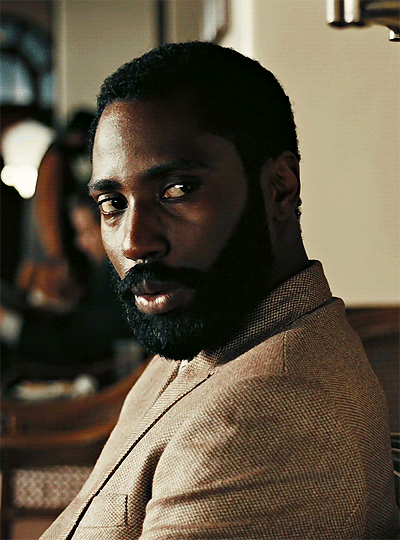

Now THREE THINGS WE NEED TO ACKNOWLEDGE FIRST:
1. I am still not entirely certain of the plot but I will be rewatching this movie because I think it was fun and the people were hot.
2. Neil is not Max. I know this is a popular theory and at first I thought it made sense since Rob dyed his hair for the role specifically and we don’t learn his past, only The Protagonist’s, but Nolan said they dropped that plotline because the timeline didn’t make sense.
3. You can view The Protagonist and Neil’s relationship as a platonic one or a romantic one my point still stands.

The surface level viewing of this movie gives you the impression that nothing matters and choice is a fallacy, what’s happened happened and there’s nothing you can do about it. But looking even a fraction deeper you realize the choices of the characters directly cause the events of the movie.
Sator is forced to live around radioactive materials in Kiev because of a neglectful government, that causes his cancer. His cancer leads him to begin communicating with the future and allows the past to invert which leads him to choosing omnicide but also directly leads to Tenet being able to stop him. His abuse leads to his death. Most importantly Neil’s death leads to The Protagonist’s life being saved which leads to The Protagonist finding Neil which cultivates the greatest relationship of either of their lives.

The most tragic part about all of this is that only in the final moments of their time together do they truly have all the pieces of their relationship laid out in front of them. The majority of the time spent with one another is with one of them not knowing their history and they’re stuck in this loop.
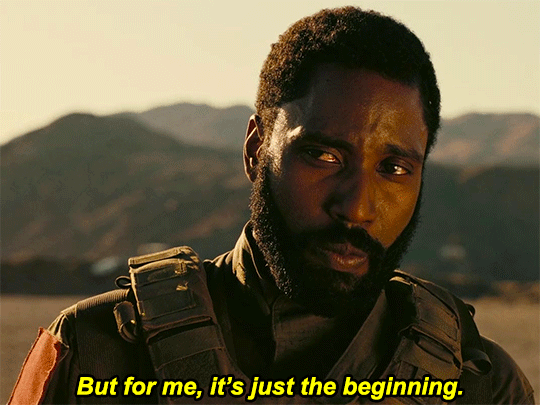
Our Neil dies at the end of the movie but we’re following The Protagonist. He will end up in the past, Neil’s past and at the end of their story Neil will be sent back to meet The Protagonist and so on and so on forever. And you can see the exact moment The Protagonist realizes this. That he’ll know Neil but Neil won’t know him, not really. Not for years.
We can see how immediately drawn to Neil The Protagonist is. He’s an undercover agent who very likely doesn’t trust anyone he hasn’t known for a long time but this is his face during his first meeting with Neil.
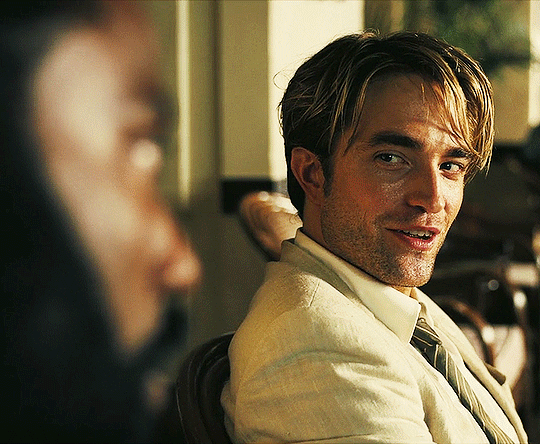
WE know why Neil is being friendly and why he stares at The Protagonist the way he does but he doesn’t. Why is he so immediately comfortable with Neil?
From the moment they meet to the final battle The Protagonist is so emotionally affected by Neil’s impending death that he considers putting the world in danger to try and save his life. He doesn’t see the point in Neil dying, and when Neil tells him that it’s just “what happened” The Protagonist doesn’t see why he should care about anything at all if every decision has already been made.
Until Neil explains to him that just because their future self has already made the decision for them, just because the path is laid out, doesn’t mean what they do doesn’t matter. Neil’s life saved everything, that matters (this one lesson goes on to affect how The Protagonist forms and runs Tenet). The Protagonist understands that yet he still wants to save Neil.
But at the end, all he can do is let Neil go. Continue moving forward.

Because there is a past for Neil. And a future for them.
*just a cute gif i wanted to include of The Protagonist staring at Neil like a day after they met.(idk how long a timeframe the movie takes place over)*

#tenet#the protagonist#neil tenet#protagoneil#inverted husbands#the protagonist x neil#sator tenet#kat tenet#infodump#love story#what’s happened happened#scifi#science fiction#time travel#except not really
310 notes
·
View notes
Text
Evil Undead, revisited
As a veteran GM, I feel that kids these days complain more about the brute fact or moral law of Evil Undead in D&D or similar games, and I get questions from people wanting to use necromancy for good purposes like having tireless skeletons plow a field. Shouldn't that make up for the [Evil] tag on spells like Animate Dead? Why is that tag there, anyway?
With a caveat that "Undead" in fantasy is a kinda vague category which can reasonably have some special cases and cosmological exceptions like repentant ghosts, here's an attempt at describing how "core" undead like skeletons and vampires still count as evil and can be smote with Smite Evil, and making them is evil even if the necromancer has good intent in contemporary terms. This is mostly written with reference to D&D 3.5, which I like for its SRD, but the principles can be used elsewhere.
TL;DR: Making undead is like a faustian bargain but with Death instead of Mephisto, and every hand you lend to Death in the world is a corrupting influence even if you get something good from it.
The TLDR is inaccurate because the implicit contract is with the negative energy plane instead of a demon or avatar. Now for the long version:
In the example of the plowing skeletons, the questioning wizard is presumably treating the plowed field as an end and the skeletons as a means to that end - he's not doing necromancy for its own sake.
So he could cut out the necromancy part. He could use Animate Objects instead of Animate Dead, and make the plow move itself. (Or build a golem, but that's another story.) But notice that Animate Objects is a higher level spell than Animate Dead, as well as being temporary. Making it permanent requires another high-level spell. Wizards (and D&D players) are prone to optimizing towards Animate Dead, because it seems to be an easier and better way to achieve the desired effect.
But why does this lower level spell work better? My answer is that when casting Animate Dead, something else is providing much of the power, and that "something else" is the Negative Energy Plane. It is the plane of annihilating everything that exists, and is not on your team. You should not be contracting with it for power. Casting Animate Dead is evil because it's teaming up with an omnicidal maniac in cosmological form.
The Negative Energy Plane is arguably not strictly speaking able to power anything, because it's negative. It's a convenient shorthand to speak of "negative energy" when referring to a drain on positive energy. An undead creature produced by Animate Dead or a similar spell contains a tiny portal-conduit to the Negative Energy Plane through which light and life and heat are sucked out of the world (=negative energy flowing in) powering a magic "turbine" that makes the undead go.
Some advanced undead creatures have the power or fine control to weaponize this conduit, thus the various life-drain and energy-drain abilities possessed by vampires and wraiths and such. Different undead have different configurations and need to feed on the living more or less often, while others get by with environmental drain. Even the environmental ones can be deadly in large quantities. The Libris Mortis splatbook hints at this, and I've taken some of my inspiration from a discussion thread on that book:

This has a bunch of fun implications that match up with other narrative roles of undead and horror tropes. That crypt (haunted) which seems unusually cold? Undead are sucking the heat out. Candles suddenly blowing out? Undead!
Even though the minor drain of a skeleton doesn't amount to hit-point-damage on the scale of combat-time (the usual metric of D&D effects), it's still a creature that leaks negative energy/sucks the life out of its surroundings. Using that to plow your field is a bad idea.
That's an immediate and practical impact; in a high fantasy setting you can get more fantastic about it. Perhaps the tiny negative-energy conduits in regular undead also serve as windows for necromancers and negative-energy-beings to look on the living world, or worse, perhaps the portal is two-way. A skeleton contains a tiny hole in the planar fabric through which The Unmaker can reach, whether to affect the world directly or to seize control of the undead.
Note: your players may still insist on trying to find a utilitarian use for this sort of life-draining undead, like a haunted refrigerator that stays cold because the ghosts are sucking the heat out of it. If they're insistent, I suggest saying "Yes, but" instead of "No", and then run with the fun implications and second-order effects of binding a dozen ghosts just to store food (obviously one ghost won't cool it enough) and what normal people will think of the Superhaunted Doomfridge. Maybe the paladins will send a complaint letter. Your PCs are Good enough that the paladins will send a letter rather than showing up to Smite Fridge immediately, right? ;-)
And now I'm imagining the Paladin Job Board posting, with the headline saying "Destruction of Evil Artifact" in big letters and the fact of "it's a fridge" in the small print.
56 notes
·
View notes
Note
Can you give us family headcanons for the Pokemon villains?
Sure! Hopefully I won’t get anything too wrong here.
Giovanni: the mob has always defined Giovanni’s family life, from the time he was young to present. His father was killed when he was a preteen, defeated by an enemy Team boss who was stronger than him. This fueled Giovanni’s desire to be as strong and dominant as he could be in every way he could be, and to make Team Rocket into the most powerful evil team in the world. This desire was only strengthened after Silver was born. He had another child, too, a year younger than Silver, but she ran away at the same time Silver did. Unlike Silver, she never came back and couldn’t be found. This haunts Giovanni to this day and his greatest fear is losing Silver permanently.
Silver: Giovanni always emphasized the importance of strength to Silver growing up. While Giovanni never forced Team Rocket on him, Silver looked up to him and wanted to follow in his footsteps, and that made Giovanni very happy. That all changed after Giovanni’s disappearance, of course. After his Pokémon journey, Silver understands the bonds between Pokémon and people and doesn’t want to break those bonds by stealing Pokémon, so he no longer wants to join Team Rocket, let alone lead it. Giovanni knows and accepts this. While Silver’s relationship with him is a little awkward now that he’s grown a conscience, they’ll stay in close contact for the rest of Giovanni’s days. Silver knows that anything else would cause his father a lot of anxiety.
Archie: he and Maxie had a long-term relationship back when they were in Team Rocket together. Since, Archie has had numerous of flings with various members of Team Aqua. He’s found it enjoyable but it doesn’t quite fill the void. Team Aqua is like a family to Archie.
Maxie: after Archie, Maxie had a few longer-term relationships during periods when his work was lighter. Nothing ever quite filled the void Archie left, though. Maxie prefers not to mix family and business. Most people in his personal life are sympathetic to Team Magma’s cause but aren’t a part of the team.
Cyrus: Cyrus cut ties with his family basically the second he left home. He also changed his name, which is why neither his grandfather nor the people of Sunyshore use his name while talking about him, and why he’s on their mind- they’re praying that the omnicidal monster they’ve seen on the news isn’t who they think it is. The commanders (except for Charon) are basically eachothers’ family, and though Cyrus wouldn’t call them family or even friends, they could be his family, too, if he opened himself up to the possibility.
N: in N’s earliest years, Pokémon of various species that wouldn’t normally even interact came together to make sure he was cared for. A darmanitan kept him warm and safe, a zoroark and woobat kept him fed, and the zoroark’s pups were his playmates. After N was captured by Ghetsis, he was surrounded by abused Pokémon, most of which were too scared of humans to give him much parenting. They nonetheless formed a strong bond with N as he grew and learned to care for them, and N would consider them family. His only human contacts were his sisters, Ghetsis, and, over the years, a few tutors who helped him with various subjects. Ghetsis was kind to N to manipulate him, and had more contact with him than anyone else, so N was attached to him before the events of the game.
Ghetsis: he was raised to be a great religious leader. While this was a somewhat unconventional upbringing, he wasn’t abused in the slightest and didn’t find this particularly unpleasant. All the corrupt elements of the religious institution that most would pass off as “it has problems to be fixed, but nothing’s perfect” fascinated Ghetsis. They were The Point to him. Targeting members of a certain religion wasn’t enough for Ghetsis, however: he wanted to be able to manipulate anyone. This is why he broke away from religion and founded Team Plasma, which uses a rhetoric that appeals to basic empathy instead.
Lysandre: his whole family and a good portion of his social circle are, with a few exceptions, such elitist, classist jerks that it’s surprising that Lysandre was a man of the people for any length of time. And of course, they were all too eager to comfort him when his philanthropic efforts weren’t going so well, letting him know that it wasn’t his fault that the lower classes didn’t know how to use his gifts.
Guzma: Guzma would consider Team Skull to be his family. After Team Skull disbanded, Guzma was forced to return to his parents briefly because he had nowhere else to go. After a while, though, Hala took him in and made him his mentee so that he wouldn’t have to live with his abuser. Many former members of Team Skull also remained close friends after the team disbanded. This includes Guzma and Plumeria.
Lusamine: Gladion took the brunt of her abuse before he ran away, both because he was the rebellious one and because he tried to keep her attention off of Lillie. Things got much worse for Lillie once he left. After Lusamine was cured of the nihilego poison, she went on to be a decent mother and her children will keep a relationship with her into their adulthood.
Rose: Rose has long wanted a family, but can’t quite hold onto a partner. The combination of Rose’s fame meaning that no one who dates him keeps their privacy, Rose’s very high expectations, and the fact that he’s pretty unlikeable once you get to know him keeps anyone from sticking around despite his wealth, handsomeness and superficial charm. It doesn’t help that he tends to treat people as tools for his image, either. If he hadn’t gone to prison, he’d probably adopt another child after Bede and try to mold them into a champion trainer.
Piers: Piers’ parents have been largely absent ever since Piers became a gym leader. By their logic, since he’d be in town all the time and was in his mid-teens by then, he was old enough to look after his little sister and so they could go off and do whatever they wanted. So Piers has had Marnie’s wellbeing as well as Spikemuth’s on his shoulders from a young age. Between that and the work he puts into his music, he doesn’t even have the energy for resentment. He absolutely adores Marnie, though.
#pokemon#thanks for the ask#rocket boss giovanni#rival silver#aqua boss archie#magma boss maxie#galactic boss cyrus#pokemon n#plasma leader ghetsis#flare boss lysandre#skull boss guzma#lusamine#chairman rose#gym leader piers#pokemon villains
82 notes
·
View notes
Text
I'll try to edit the article to note that bit then, but that does NOT mean the Jedi, as in the High Council, played any role in her release. All that means is that Qui-Gon kept his word (let's not forget, it's established that Qui-Gon's a bit of a maverick when it comes to being a Jedi, going against the Council more than a few times, so for all we know, Qui-Gon might have talked to a random Jedi [ie, NOT a council member] and did it without the council's knowledge). And BTW, Shmi herself was so depressed afterwards that part of the reason Watto disabled her explosive leash even BEFORE selling her to Cliegg Lars was precisely to avoid her essentially committing suicide by wandering off beyond the reservation due to her grief, and still hopes for Anakin to return as a Knight.
And I find that bit particularly hard to believe considering he had no such qualms when literally testing Anakin in TPM, making explicit he read Anakin's mind without the latter even giving consent. As far as your last point, isn't that literally the POINT behind the Jedi Mind Trick, their signature move? And please don't give me "it only works on the weak minded." The Imperial Handbook (which, while technically made post-Disney sale, was also made BEFORE the Legends/Canon split, meaning it's barely authorized by George Lucas like all EU works) had given some details on their mindset (namely, and I quote, "Stormtroopers are victorious because of our training, our uniformity, and our ability to bring overwhelming firepower to bear. We offer our lives to our Emperor."), and there was a footnote that said "Stormtrooper ideology is terrifying in its thoroughness, They can't be reasoned with, which means they can't be deprogrammed." And the person who wrote that footnote is none other than Leia. That footnote strongly implied that Stormtroopers if anything were STRONG-MINDED, not weak-minded under the traditional sense (meaning it literally required the Force to make ANY leeway on them, literally any leeway). Had they been truly weak-minded, it if anything would have been notoriously easy for them to deprogram (think The Rise and Fall of Julius Caesar, namely the funeral scene, for a good idea of what I'm getting at).
Except the entire POINT behind that bit is precisely BECAUSE they fear loss ultimately. You want a GOOD example of a Superman version who literally DIDN'T fear loss to such an extent that he's practically the epitome since birth of the trope Beware the Superman? Try Brandon Breyer from the movie BrightBurn. That guy CLEARLY lacked attachments of ANY sort, lacked the fear of ANY loss at all, and it's implied he was a brood parasite as well. And BTW, telling me to accept that "life ends and there's nothing I can do to stop it" is a VERY bad idea since I'm if anything the type who comes VERY close to fully accepting it to the extent of being borderline fatalistic about it, even regarding my OWN life, much less others. In fact, it's such a slippery slope for me that I'm if anything the type of guy who would actually use THAT exact rationale to not only NOT save anyone at all but if anything make me all the MORE willing to cause mass deaths as a result if nothing held me back, especially God watching me constantly. That was quite literally Kefka Palazzo's rationale for his omnicidal actions, in fact, it was quite literally Seymour Guado's rationale as well, even going so far as to claim that he's freeing his victims when he kills them (that's how messed up he truly was). If anything, fear of loss is PRECISELY why I have compassion at all, since I know just HOW valuable life is, whether my own or anyone else's and dread its loss under ANY reason. If I lacked any fear of loss, I'd if anything use as my rationale "The worse, the better" or "A million is a statistic" and go out of my WAY to cause death. I'd know because far too many real-world tyrants in the prior century went that precise route (like Vladimir Lenin, to use an example, who actually was notorious for being the guy who first legalized abortion, even allowed for unlimited access to it). Oh, and for the record, Galenth was not anything like Anakin. If anything, he was more like Palpatine, or even an evil version of Yoda. THIS is what Galenth is like, and you'll see EXACTLY what I mean by that:
youtube
youtube
youtube
If ANYONE was like Anakin, it was Seymour Guado from Final Fantasy X (though I'll be quick to point out that, if anything, Seymour's essentially Anakin if he actually DID take Yoda's "advice" to heart):
youtube
youtube
Oh, and BTW, this is one of the events that turned him into such a nihilistic nutcase:
youtube
And based on his speeches, he MORE than accepted it by the time he became an adulthood. In fact, became TOO accepting of it to such an extent that he even began to nihilistically believe death and suffering was the entire POINT behind life.
Also, considering George Lucas cheerleaded Barack Obama, who even during the election cycle was notoriously pro-abortion (even refused the Red Envelope campaign), to such an extent that Jack Nicholson refused to associate with him and Martin Sheen refused to even DINE with him precisely because of it, and he also made it very clear repeatedly that he modeled his heroes after the Vietcong, who definitely never respected life at all (and in fact, ironically enough, their methods were more invokative of the EMPIRE rather than their actual basis in Star Wars), and even implied recently that he at the time KNEW they were a bunch of mass murderers when he modeled the heroes after them, I wouldn't take his life lessons at all, and I don't think you should either. Heck, recently, my mom and dad suffered severe ailments (UTI-induced memory loss that caused temporary paralysis and she's still getting over right now, as well as Encephilitis-Meningitis), and my instinct when they suffered from it was going out of my way to help them and make sure they got better, even got concerned during work because of it. Had I adopted anything like what the Jedi promoted regarding non-attachments, I would have put a pillow on their face and quickened their demise with the rationale that death was going to happen anyway, not made any effort to help them at all. I also chipped in $20 for Rachel Lillis's cancer treatment when I learned of it, as soon as I got my paycheck in fact, even prayed every night before bed for her to recover or at least have her not suffer, and I would have done it even if I had known at the time that she was suffering from stage 4. In fact, want a good idea of how an ACTUAL greedy Anakin would have treated his wife and possibly his kids? Try having him act like the crook of the week in the NCIS Episode See No Evil, the guy who actually orchestrated his own family's kidnapping just to have an excuse to rob his bosses at the Navy.
Technically, the Death Star was ALSO built partly as part of preparations to fight off the Yuuzhan Vong. Even ignoring that bit, as I pointed out, George Lucas had no qualms singing praises for a group, the Vietcong, who literally USED terror to enforce Marxism in Vietnam (and if anything we were called in to STOP them). And as far as why he'd do that, same reason why the Patriots manipulated terrorists into participating in the S3 Plan, for the heck of it and relishing in power and control, especially when Palpatine at least by that point didn't even view them as a threat. As far as Palpatine is concerned, technically, he never actually TOLD Luke to kill Vader (contrast with Dooku, not to mention how he tried to get Galen Marek to become his apprentice in a similar manner. Oh, and BTW, Palpatine even tried to bait Galen into killing him after he actually bested him, and if anything was FURIOUS at Rahm Kota for interfering, implying he actually DID want Marek to kill him, if for no other reason than to ensure Marek turned to the Dark Side). And I'm pretty sure if Palpatine TRULY didn't want competition, he would have just punted Vader's body into Mustafar and finished the job just to ensure he alone was the only Force User rather than go out of his way to rebuild Vader (which, BTW, the book made VERY clear his concern for Vader's survival surprised EVEN him, and even Ian McDiarmid, his actor, made it clear that was a redeemable trait of Palpatine's, or at least a humane trait of his, and that's the guy who reluctantly stated Palpatine was likely evil from birth.). Besides, Gaston was downright homicidal regarding threats as well (let's not forget, the whole reason he picked a fight with Beast with the intention of murdering him was due to intense jealousy at Belle liking Beast more than him. When Beast overpowered him and left him dangling from the castle by the neck, he even proceeded to beg for his life like a coward, despite his profession logically NOT allowing for that). Heck, his gloating to Yoda even implied he not only fully expected Vader to act out the Rule of Two against him soon, but even looked FORWARD to it ("You cannot stop me! Soon Darth Vader will become far more powerful than EITHER of us!" And let's not forget, the Rule of Two specifically states that once the apprentice is stronger than the master, the latter's dead meat by the apprentice's hands).
@blenderbender1811 This post is meant to be a reblog of this bit, but since I'm most likely blocked by the OP, I can't do that, so I have to settle for this instead:
Okay, found the passage in question:
Orbital mirrors rotated, resolving the faint light of Coruscant's sun to erase the stars; fireships crosshatched the sky with contrails of chemical air scrubber, bleaching away the last reminders of the fires of days past; chill remnants of night slid down the High Council Tower of the Jedi Temple; and within the cloistered chamber itself, Obi-Wan was still trying to talk them out of it. "Yes, of course I trust him," he said patiently. "We can always trust Anakin to do what he thinks is right. But we can't trust him to do what he's told. He can't be made to simply obey. Believe me: I've been trying for many years." Conflicting currents of energy swirled and clashed in the Council Chamber. Traditionally, decisions of the Council were reached by quiet, mutual contemplation of the flow of the Force, until all the Council was of a single mind on the matter. But Obi-Wan knew of this tradition only by reputation, from tales in the archives and stories told by Masters whose tenure on the Council predated the return of the Sith. In the all-too-short years since Obi-Wan's own elevation, argument in this Chamber was more the rule than the exception. "An unintentional opportunity, the Chancellor has given us," Yoda said gravely. "A window he has opened into the operations of his office. Fools we would be, to close our eyes." "Then we should use someone else's eyes," Obi-Wan said "Forgive me, Master Yoda, but you just don't know him the way I do. None of you does. He is fiercely loyal, and there is not a gram of deception in him. You've all seen it; it's one of the arguments that some of you, here in this room, have used against elevating him to Master: he lacks true Jedi reserve, that's what you've said. And by that we all mean that he wears his emotions like a HoloNet banner. How can you ask him to lie to a friend—to spy upon him?" "That is why we must call upon a friend to ask him," said Agen Kolar in his gentle Zabrak baritone. "You don't understand. Don't make him choose between me and Palpatine—" "Why not?" asked the holopresence of Plo Koon from the bridge of Courageous, where he directed the Republic Navy strike force against the Separatist choke point in the Ywllandr system. "Do you fear you would lose such a contest?" "You don't know how much Palpatine's friendship has meant to him over the years. You're asking him to use that friendship as a weapon! To stab his friend in the back. Don't you understand what this will cost him, even if Palpatine is entirely innocent? Especially if he's innocent. Their relationship will never be the same—" "And that," Mace Windu said, "may be the best argument in favor of this plan. I have told you all what I have seen of the energy between Skywalker and the Supreme Chancellor. Anything that might distance young Skywalker from Palpatine's influence is worth the attempt." Obi-Wan didn't need to reach into the Force to know that he would lose this argument. He inclined his head. "I will, of course, abide by the ruling of this Council." "Doubt of that, none of us has." Yoda turned his green gaze on the other councilors. "But if to be done this is, decide we must how best to use him."
And, that's PRECISELY what I described happened. The bolded bit is my emphasis reinforcing my point.
14 notes
·
View notes
Text
Posting this for @pilotkinkade in response to their recent post made here, regarding concerns about VLD and how it includes white savior complex or potentially smears Allura’s character with that complex. I’m not reblogging directly because this is a long response lol. Thank you pilotkinkade for chatting earlier; I hope you find this post interesting at least and would be curious of your thoughts in return!
---
I do agree with your general sentiments, that VLD takes on a disquieting savior complex throughout a good portion of the show, even more so than in previous Voltron iterations. For me, it feels most apparent in the way that Voltron as an all-powerful machine in VLD is piloted by its second generation.
To compare: In the original OG alliance (Alfor, Zarkon, Trigel, Gyrgan, and Blaytz), multiple major races were represented, functioning as one to save their own collective galaxy from threats. So even among the OG paladins, there were checks and balances (maybe Zarkon had the strongest military skills personally, but Alfor had the alchemy, etc.), with mass racial diversity. This seemed like a pretty innovative and cool addition to the Voltron franchise. The s3 finale also clarifies that, unlike VLD’s second-generation, all of these paladins were leaders of their people. This meant they had political and legal authority/experience that an average warrior or citizen wouldn’t.
By removing that whole structure and retrofitting Voltron with (mostly) a group of unprepared teenagers from a single planet entirely uninvolved in the universal conflict, it created a lot of strange hierarchies...
We see much of the known universe raise up people who had zero prior experience with war, and little to no military or diplomatic training, as well as very little awareness of the traumas or people groups involved in this war. (Shiro is possibly the exception here.) But suddenly, all of these paladins also had unfettered, largely unquestioned access to ultimate power to carry out whatever vision they felt was right in the moment. Because simply “might is right,” we see even highly experienced commanders like Kolivan become castrated in authority compared to Team Voltron. Various alien groups express upset or side-eye Team Voltron’s well-meaning actions but obvious insensitivity to/ignorance of their problems or fears. Even at the paladin-level, a princess trained to fight and lead is subordinated to a boy with zero leadership training whatsoever (which is very different from previous iterations where Keith was actually very competent, more experienced, and wanted to be a leader).
And when Voltron plays the unchecked judge, jury, and executioner across the entire universe, the new paladins as a whole also do not have the political or legal authority the OG pallies did in the boundaries of their own galaxy. The second-gen paladins are not authorities of their people or representative of the people groups affected in the war they’re now leading. The OG pallies built the actual legend of Voltron in less than 28 decaphoebs, clearly going beyond their 5 nations to help others suffering from natural disasters or unknown needs, which might raise some eyebrows perhaps because we don’t know what all that entailed. But while we see that the Voltron machine eventually got celebrated, the OG pallies are never shown personally soaking in some kind of savior celebration…



(Photo ID: Alfor says, “Why I joined up this band of scoundrels, I’ll never know.” Trigel responds, “Because we’re the only band of scoundrels that would have you.” Third screenshot is of the paladins celebrating their alliance win by themselves.)
…compared to second-gen paladins (or some anyway) who pretty clearly soak in the love and prestige they’ve received based off the historical and legendary precedence of the OG alliance’s work:

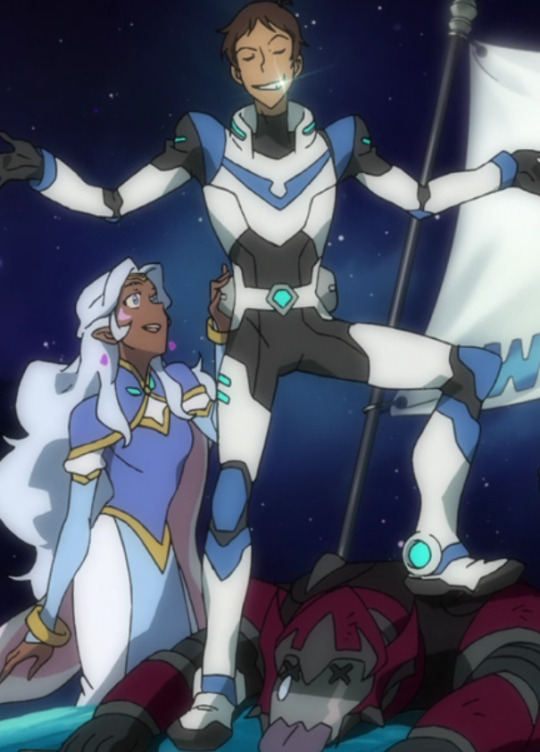
(Photo IDs: Lance taking selfies with aliens excited to be around paladins. A second screenshot of Lance daydreaming about being a universal savior, stomping on Zarkon, planting a flag to mark ownership, and having Allura stare up at him in worship.)
In fact, a lot of the pro-Voltron war propaganda relies heavily more on recreating the legend already built for them, than on the actual competency or experience of the current paladins:
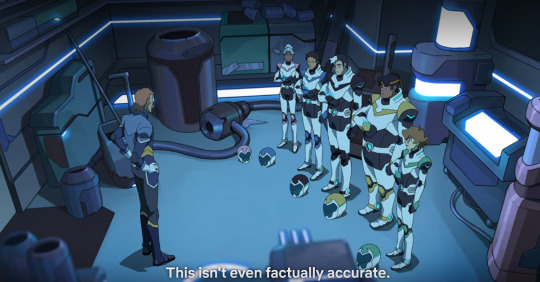

(Photo ID: Pidge complains about the war propaganda scripts, “This isn’t even factually accurate.” Coran replies, “Well, this is the Legend of Voltron, not the documentary of Voltron.”)
On that note, we even see the scripts reverse who is actually the most competent or capable of performing.


(Photo ID: Coran says, “Ladies and gentle-aliens, bear witness as the Paladins of Voltron attack Zarkon’s base to save the helpless Princess Allura!”)
Coran’s script, however well-meant, pretty massively infantilizes Allura as someone who needs to be saved by an external force, rather than mentioning her as someone who is an active and critical ally of the Voltron paladins in this war.
Unlike Coran’s script, Princess Allura isn’t helpless. In terms of the second-generation paladins, she’s has the most war-time experience, and is also the one that the paladins lean on constantly to create a meaningful connection with other people groups who are otherwise hesitant about Voltron.
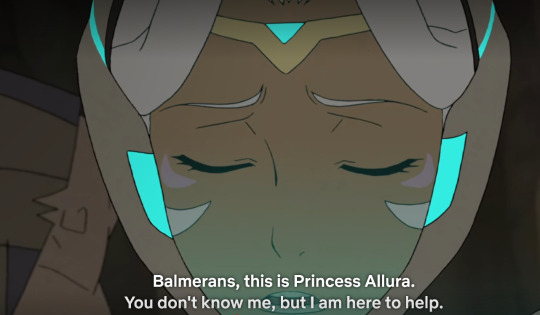

(Photo ID: Allura speaks to the Balmeran people, “Balmerans, this is Princess Allura. You don’t know me, but I am here to help. I know what it’s like to watch your home planet die.”)
Allura is the successor to the Altean monarchy and a direct victim of the OG galaxy wars. So unlike other second-gen paladins, she has some semblance of legal/political authority that she was actively trained for, as well as personal skin in the game. She is ultimately the only paladin who has experienced a mass omnicide of her home and people, similar to other victims of the Galra regime. She also still accepts the authority of her father, whose AI tells her in season 1 to be prepared to sacrifice everything to undo his mistakes.
We see Allura from that point onward functioning under that directive from her father and king—to sacrifice everything she has to end Zarkon’s regime. One could potentially make the argument that, within this structure, Allura might suffer from a certain subset of “white knight syndrome,” in which one feels they’re worthless if they’re not sacrificing for others. If I have my facts right, it’s a different psychological state from white savior complex (in which I define white savior complex as “when someone outside the issue at hand barges in to make a change that may or may not benefit the recipient, simply to make themselves feel better or appear useful, without regard to the recipient’s wishes or real needs”). But I feel even the comparison of “white knight syndrome” gets dicey. Because Allura is shown as acting happy without necessarily sacrificing things (in fact, she acts progressively depressed s7-s8, the more she has to give up intrinsic things about herself or her identity). But when Allura chooses to assist or sacrifice, the sacrifice she makes has a very relevant and functional impact for the people she helps.
In season 1, she chooses to sacrifice herself to save Shiro. Shiro was, at that time, the Black Paladin and leader of Voltron, so Allura saw herself as functionally the less important of the two to save since she did not pilot the universe’s only weapon against Zarkon.
With the Balmera, she similarly chooses to act because the Balmerans themselves acknowledge they are entirely out of options, and also because the Balmerans (and the Balmera itself) accept her help she offers. At this point in time, she has already established a deep personal connection with them by virtue of their shared trauma of losing their home planets.
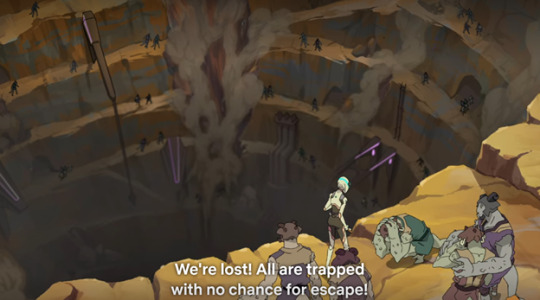


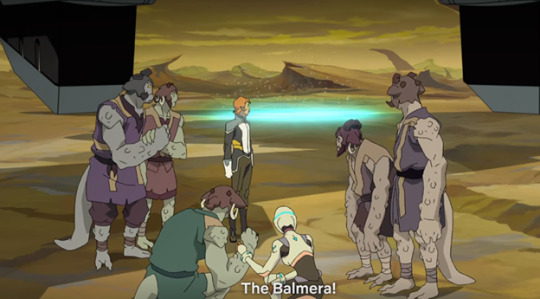
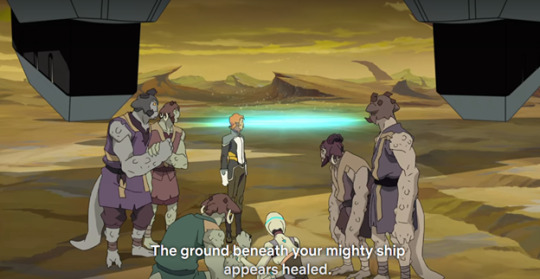
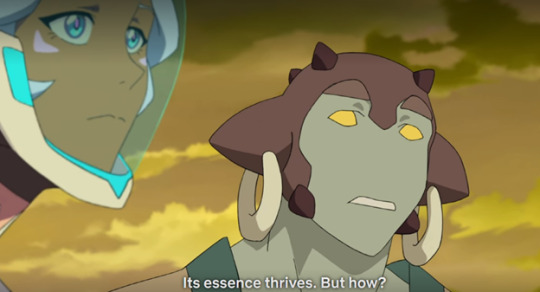
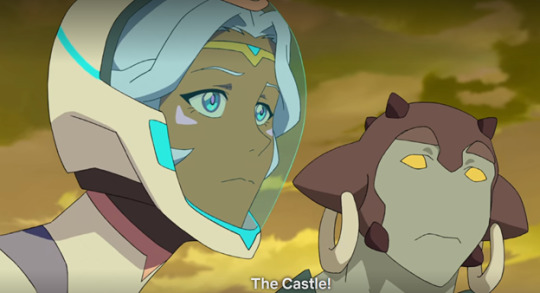
(Photo IDs: Shay says, “We’re lost! All are trapped with no chance for escape!” Allura says, “We can’t give up.” Shay responds, “But what can be done?” The group realizes the Balmera is regenerating beneath the ship, and Shay wonders why. Allura says, “The Castle!”)
Here, Allura assumes that the Castle—which is powered by a Balmeran crystal itself—could be regenerating the Balmera. But a Balmeran elder corrects her:

(Photo ID: A Balmeran elder says, “Not just the Castle, but you, as well.”)
So Allura did not even recognize at first that she was in any way a part of the solution to the Balmera regenerating.
Regarding the Balmera act itself, I’m not sure it satisfies the conditions for a white savior complex? I’m curious about your thoughts here, because I guess I saw it happening differently, from a witchcraft perspective...
We know from both Coran and Shay that originally, Alteans were one of the historical races who sacrificed some of their own energy to replenish the Balmera when seeking a crystal:
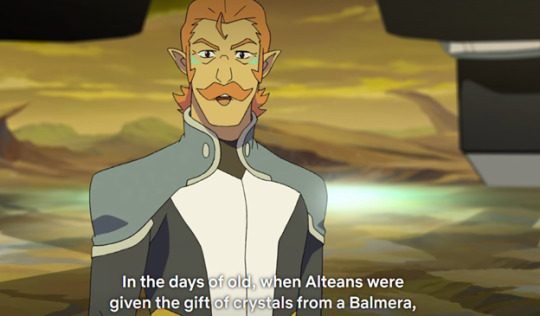

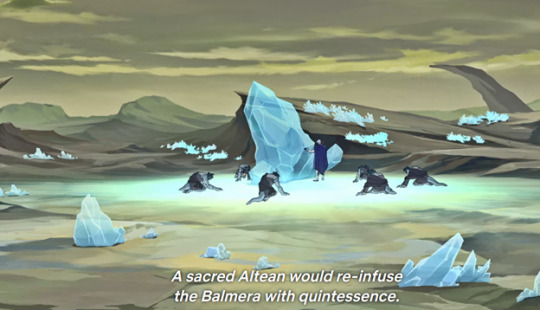
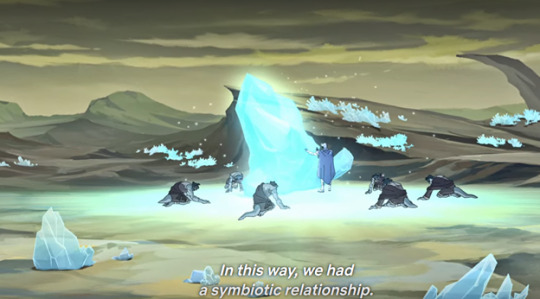
(Photo ID: Coran saying, “In the days of old, when Alteans were given the gift of crystals from a Balmera, we would repay its sacrifice by performing a ceremony. A sacred Altean would re-infuse the Balmera with quintessence. In this way, we had a symbiotic relationship.”)
We see that Balmerans were a voluntary part of this energy exchange by virtue of their unique connective powers (which is likely why we see them kneeling and activating said powers during these ceremonies).
Shay herself seems to indicate she is highly aware of these old ceremonies:
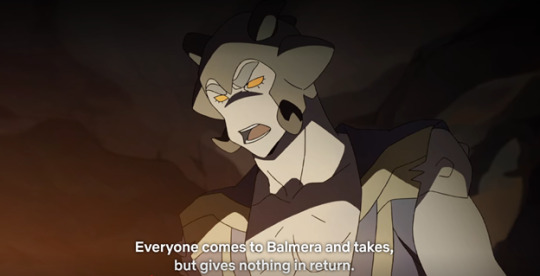
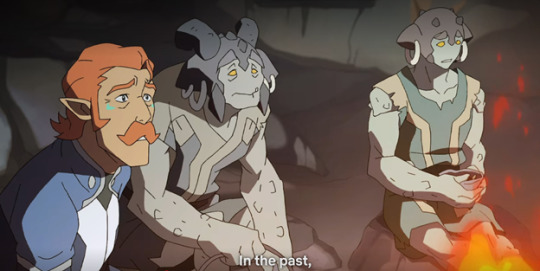
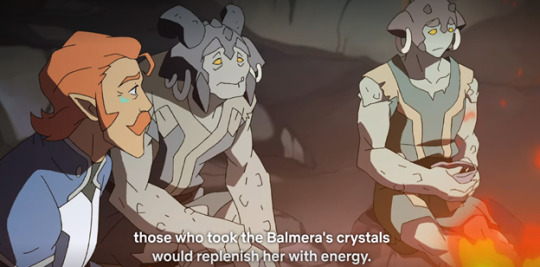
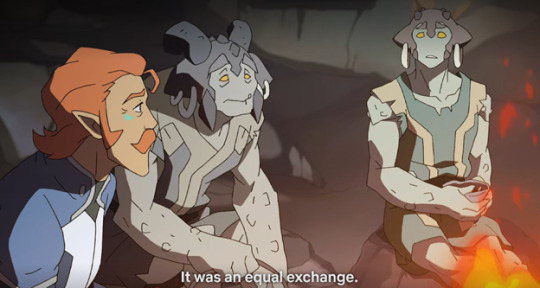
(Photo ID: Rax says, “Everyone comes to Balmera and takes, but gives nothing in return!” Shay says, “In the past, those who took the Balmera’s crystals would replenish her with energy. It was an equal exchange.”)
Shay agrees that the ceremony itself involves a sacred exchange of life force.
So I would argue that in this case, the Balmerans are not kneeling to Allura specifically or worshiping someone—it seems to be just the imagery associated with magical spells/magical transfers (where one object in the middle is the main conduit/focal point, and the other objects surrounding help to create and sustain the spell/protective barrier, etc).
One of the basic practices in real-world witchcraft is casting a magic/ritual circle. The circle creates a space where the spell, ritual, or form of protection can be performed. Forgive the stock image, but here’s just a super basic example:

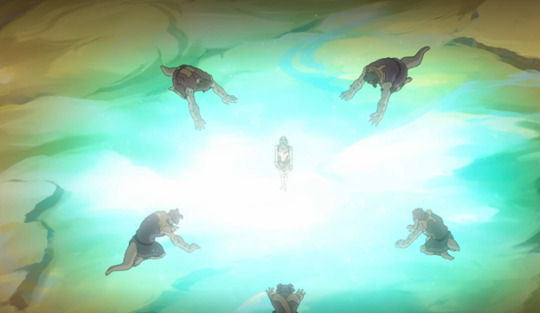
(Photo ID: A magic circle in the form of a pentagram, with a candle in the middle, compared to a screenshot of 5 Balmerans surrounding Allura in the form of a pentacle, creating a sacred space with Allura glowing in the center.)
The five points in particular mimic standard pentacle-based ritual circles designed to create a sacred space of some kind. We do see various configurations of witchcraft imagery used in other instances throughout the show, such as when the druids have to help Haggar sustain her spells:
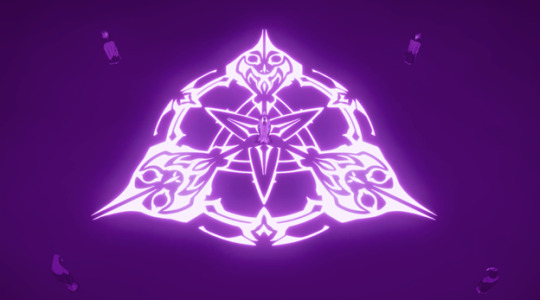
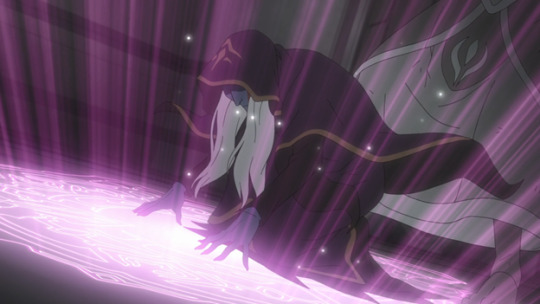
(Photo ID: Haggar centered in a magic circle, surrounded by druids helping her complete the ritual. Haggar kneels against the glowing symbols to complete the ritual.)
I think, similar to the druids that Haggar relied upon to help her complete a spell, it can be argued that the Balmerans were an active part of the regeneration spell with Allura. We see across the entire Balmera that they magically connect to help sustain the energy transfer, because it’s a planet-wide, massive undertaking:


(Photo ID: Balmerans activating their connection to the Balmera in the middle of the sacred ceremony to regenerate the Balmera.)
To me, it felt like the Balmerans were necessary to complete this ceremony--without their agreement to this energy exchange, and without them connecting to the Balmera to assist the transfer, Allura might not have been able to connect her life force and transfer power to the whole planet.
And to complete the ceremony, Allura herself kneels as well, just as Haggar did and just as the Balmerans around her do, in connection with the Balmera:
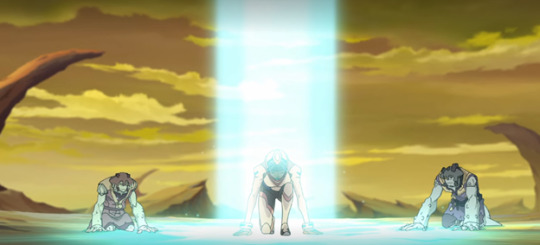
(Photo ID: Allura kneeling alongside Balmerans to complete the ritual.)
(Which means she’s technically kneeling to at least three other Balmerans in front of her.)
So I think the kneeling imagery would not correlate to some white savior complex event as suggested.
One other thought I had is that I feel help from a “white savior” is often haphazard and pushed onto recipients regardless of their thoughts or real needs. In comparison, we know that the Balmerans were willing to try this spell with Allura and accepted her idea of attempting the ancient ceremony. The only person who expressed hesitancy is Coran, who warns Allura that this attempt could kill her.

(Photo ID: Coran warns Allura, “To heal an entire planet, it could take more energy than you possess.”)
I do think it could again be argued that Allura seriously undermines her own value and worth in an attempt to help everyone, no matter the cost, which potentially gets more into white knight syndrome born out of trauma than white savior complex born out of privilege. She snaps back at Coran for being concerned about her well-being, and then she proceeds to enact the ceremony, not knowing for sure whether she’d live or die. But Allura also knows that her life force is uniquely tied to Voltron and that she is the only one with this kind of connection to the Castle ship’s battle-class Balmera crystal—all of this makes her a very powerful capacitor in a lot of ways. Which is why she looks like this after the ceremony:
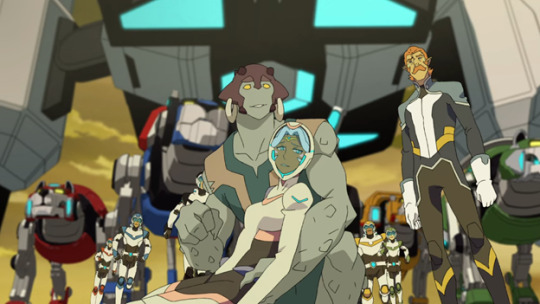
(Photo ID: Allura having collapsed in Shay’s arms after regenerating the Balmera, but her physical features are not otherwise affected.)
And not like this:
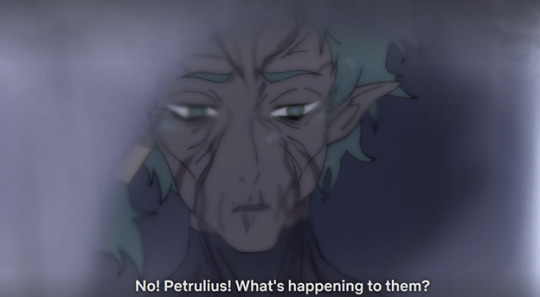
(Photo ID: A screenshot of an Altean named Petrulius from season 6, whose features are distorted after having had the life/quintessence sucked out of him.)
So to me, it seemed that Allura was enacting an ages-old, magical ceremony approved by and wanted by the Balmerans—simply on a scale that no one had ever before attempted. And it’s likely that no one else would or could attempt it, because Allura is the single character in the entire universe whose personal life force is tied to Voltron’s regenerative energy (by virtue of Alfor’s alchemy on her as mentioned in episode 1). It’s an even deeper tie to the whole machine than the transient bond between paladin and lion. No other Balmeran or Galran or Altean had that kind of tie in their life force. Likely, even Alfor would have died if he’d attempted this act himself without being connected to an infinite power source.
And after Allura saves the Balmera with assistance from Balmerans, we also do not see her like this with the Balmeran people:

(Photo ID: Lance soaking up a savior fantasy as previously mentioned in this meta.)
Instead, post-Balmera resurrection, we see it’s actually not even the Balmerans themselves who thank Allura. The Balmerans simply convey the will of the Balmera, which Allura cannot hear:

(Photo ID: A Balmeran says to Allura, “Yes. The Balmera lives. It thanks you.”)
So backing up for a second, I do think there are much larger issues happening in the narrative with Voltron itself, with the unequal power dynamics of having young, inexperienced people from a single planet make and enact all the big universal decisions. But in the instance with the Balmera, it seemed like Allura was openly welcomed to help save the planet, using magical ceremonies as approved by the Balmerans themselves for millennia, and that the Balmerans were not passive in those ceremonies but a necessary part of their success.
In general, Allura doesn’t seem to embody the “white savior complex” vibe at all to me, unlike some others in the show. Even in season 8, when Allura planned to make The Really Big Sacrifice, she asked her team to keep her actions a secret. She literally didn’t care for any respect or acknowledgment or prestige in exchange for sacrificing her life. She was doing what needed to be done because she was, once again, one of the few who could even perform at that level:
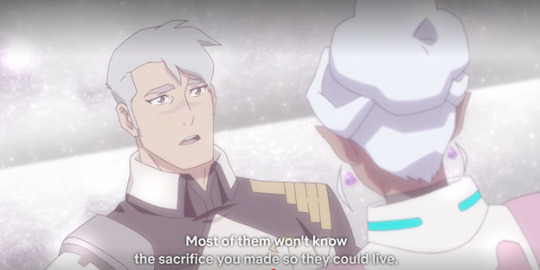
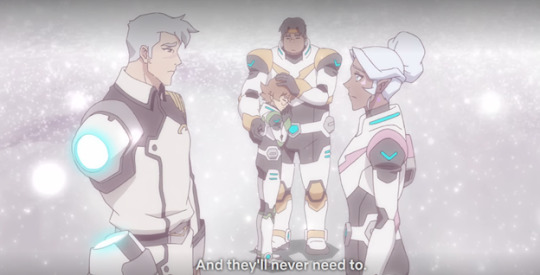
(Photo ID: Shiro says to Allura, “Most of them won’t know the sacrifice you made so they could live.” Allura replies, “And they’ll never need to.”)
(As an aside, I would argue that it was entirely unnecessary that the narrative would demand Allura sacrifice herself at all when she was literally standing in the universe’s seat of power alongside other powerful beings like her own father or the billions of other magic-wielding dead people, because apparently the lines between life and death blur in that space.)
(I also think there are some questionable “master race” vibes in the VLD universe in general, given that it forcefully pushes, even against the wishes of Alteans themselves, that Alteans are the only ones who can wield the big power to do big things. It’s clear that other groups and beings can wield magical abilities, but the larger narrative very oddly pins the “purest quintessence/bluest blood” back on Alteans time and time again in later seasons, leaving Allura in basically a no-win, no-help-available situation until other Alteans come along.)
So yeah, I hope something in this meta might help settle some concerns about Allura as a representation of white savior complex? Or at least that this would open conversation for further discussion about what could be done in future iterations to avoid that messaging. Because yeah, I agree with you that the unquestioned savior complexes in this show are a topic that can and should be discussed! And also that, despite early world-building to suggest otherwise, the narrative especially in s6-s8 pushes that Alteans have a “purer/more alive” life force compared to any other race or form. Which is just…hm. Like, the master race vibes of all that are weird and definitely not even inherent to the Voltron franchise. (In previous iterations, humans, Galrans/Drule, and Alteans could all perform incredible levels of magic. For example, in Dynamite Voltron, Keith, Lotor, and Lotor’s siblings had all been taught magic.)
There’s definitely some weird images and unnatural power dynamics in VLD at times. It seems like more often than not, the narrative does strive to make Allura sacrificing something the only viable resort for anyone ever. In those circumstances, I’m just not convinced that she herself functions as an embodiment of white savior complex, by virtue of her behavior in those instances. But it’s definitely weird that the narrative places so much weight on her when the larger Team Voltron narrative is supposed to be about found family and strength in unity.
(If you read this far, thank you! Sorry I’m not succinct.)
#Voltron#Voltron meta#Voltron critical in ways#Allura#Balmera episode#discussions of white savior complex#I ultimately state that Allura doesn't seem to meet the basic behaviors for that#but the show does get into some strange master race stuff in terms of abilities#and we do see several iimages of white savior complex throughout the show by virtue of some other characters#which idk why that got dropped in without at least a reflection on it#like I can handle problematic stories but prefer it when they know they're problematic lol#in VLD it felt like I was supposed to be cheering for those issues#that I wasn't supposed to question it or that I was supposed to actually connect with that fantasy#I feel like this is a really interesting topic because in other iterations there were other Voltrons#as in more people had similar machines#which I feel like helped to control the savior complex inherent in manning a powerful weapon#and in fact one iteration goes as far to say that voltron ISN'T special at all#which surprises various characters#Just a very different vibe from VLD entirely#I'm really fascinated by that#Anyway thanks for reading my rambles!
30 notes
·
View notes
Text
Series Four of Doctor Who certainly has it’s strengths and weakness. Like all things, so that’s not a particularly useful statement. It might be better to say that Series Four has some particularly strong strengths, and with them some equally deleterious weaknesses.
The key strength in Series Four is Donna Noble, the companion who is not in love with the Doctor. It’s a new dynamic for the revival - a character who is both capable and willing to just go off at the Doctor. Yet there’s still a strong relationship between the both of them, just on a level where Donna isn’t randomly stopping in the middle of episodes to pine ineffectually. It also means that someone is providing a pushback against some of the Doctor’s worst aspects, such as being okay with blowing up random cities because Time Says So. Of course, Donna isn’t all brashness and loudness. She’s actually fairly compassionate, once the right situation arises.
Of course, things end up falling over since Donna is given a Cosmic Destiny. Apparently, meeting the Doctor twice is such an unlikely event that it means you are mysteriously connected to him across time and space. This is... not good writing, actually. Donna has something of a minor arc about how she’s sort of average, and it’s solved by making literally the Most Important Person. Rather than her maybe going undergoing character growth and learning that her talents and abilities are important in their own ways. Which you know, they are, since her admin skills are important in both The Sontaran Strategem and The Doctor’s Daughter. It works in Turn Left, because hey this show has time travel so the whole butterfly effect thing works, but Journey’s End just goes too far. Add in that Donna’s arc ultimately goes backwards, and you’ve got something that’s just not good. Once again, something Steven Moffat is blamed for actually started with Russel T. Davis! (Moffat still deserves blame for many things.)
There’s also the side-effect of the Cosmic Destiny stuff where Slyvia Noble doesn’t really get any flak for being a somewhat bad person. There’s one line in Journey’s End from the Doctor about the issue, and that’s it. Jackie and Francine might both physically assult the Doctor, but they both do it out of concern for their daughter’s safety. Meanwhile Slyvia is just here providing a justification for why Donna is the way she is.
Episode-wise, Series Four has a quite a few strong ones, some generally good to adaquate ones, a not much in the way of really bad ones. For the episodes that are more of a miss, it’s less that they have overall problems, and more that they suddenly go off the rails in some way. It’s a little worse in that the episodes that do this tend to be second parts, which can end up tainting the entire story, but things aren’t going too wrong yet.
Of course, the big issue from Series Four is that’s it’s the foundations of Sad Tenth Doctor. The infamous Sad Doctor in the Rain gif is from this season, afterall. It also starts to screw with the Doctor’s morality in ways that don’t pan out well, meaning you end up with subtext like “genocide is bad, except when it isn’t“. Ten is somehow turned into both the man who kills himself murdering the Racnoss, and the man who gets upset that the Daleks are rewipe-outed, after they just attempted omnicide. And this is only going to get worse. A lot of problems started early, it turns out.
So, what’s the last word on Series Four? Donna Noble deserved better. Or, if you want an actual word: cliff. Right at the end, things suddenly go to hell for no good narrative or thematic reason. Ain’t that grand? Honestly, if it weren’t for Donna’s terrible ending, I think Series Four would be fairly well regarded. In fact, it’s probably above par. The good episodes are good, and the bad episodes aren’t that bad, and have enough good parts to be watchable. Plus it’s got Midnight just in there, which has to count for something. However, endings do matter, and Series Four just doesn’t end on the right note.
18 notes
·
View notes
Text
Begin Again- Fallout New Vegas DLC analysis Pt.2
youtube
Last time I discussed this I went on about the themes of letting go and beginning again in Fallout: New Vegas, specifically the first two expansions, Dead Money and Honest Hearts. This time, I’m continuing that into the other two- Old World Blues and Lonesome Road.
As before, spoilers abound.

Old World Blues
The silliest of the 4 DLCs, Old World Blues takes heavy inspiration from the more fantastical, mad science elements of Fallout’s basis, taking place in a giant research facility filled with robots, lobotomised people, and brains in jars. It has some of the most hilarious dialogue in the entire series, between the kooky scientists in the Think Tank, Dr. Mobius himself, and literally having a chat with your own brain.

The thematics of Old World Blues, excepting its entire plot referencing the Wizard of Oz (much like Dead Money references the Legend of the Sierra Madre), largely requires being fully spoiled to appreciate. Essentially, the old world scientists of the Big MT have been doing ScienceTM for a very long time, without any Old World for their creations to benefit. They’re unable to let go of the past- literally, in fact, due to the actions of the supposed villain, Dr. Mobius. Mobius has locked his former compatriots in some sort of mental loop, forcing them to constantly repeat (begin again, hmmmmmmm?????) the same experiments, while menacing them to keep them and their creations out of the greater wasteland, seeing as they’ve already done quite a lot of damage to the Mojave as it is.

In a way, then, the ending of Old World Blues (assuming you don’t just kill the Think Tank off) has the Big MT begin again, with your character making sure they don’t go as off the rails as before- the requirement for this being convincing four of the scientists to let go of their hangups, or embrace and move past their mistakes or flaws. The actual details of this are pretty silly- 0 has to get over his nomenclature problem, Borous has to realise what a shit he’s been, especially to his dog, Dala has to…well the less said the better, and 8 is pretty well adjusted actually you just have to be mates with him. Either way, you’re have to help them move on as people, beyond the mad science loops they’ve been stuck in for centuries and onto more fruitful pursuits.

Lonesome Road
Lonesome Road is the final DLC of the game, and the one the other four have been building up to. It’s a journey through the deadliest region in the Mojave, and it’s villain is the background villain for most of the other DLCs.

It was Ulysses who led Elijah, and later Christine, to the Sierra Madre. It was Ulysses who taught the White Legs their ways, leading to the sacking of New Canaan. It was Ulysses who broke the Think Tank, leading them to the dangerous position they currently pose. And it was Ulysses who, seeing the Courier’s name next on the list, turned down the Platinum Chip job, leading to the Courier getting ambushed and shot at the beginning of the game.

Ulysses, despite appearances of being smarter, wiser than the other villains, has his own things he needs to let go of. The past, revenge, and his plan.
Ulysses is obsessed with America, wearing its flag on his back, taking his name from one of its generals. Symbology, of Old World America, of his former tribe, and of the new factions of the Mojave, are incredibly important- part of his hatred for the NCR stems from their use of American symbolism and government without truly understanding their meaning or place. Understanding history, ultimately, is one of the ways to talk him down, either through his own trail or that of ED-E, drawing a line between his obsession and that of the Enclave. He is not the only one carrying America on his back, and reminding him of such can help him let go of his plotting.

The Divide in which Lonesome Road takes place was once a bustling community, a city built from the wreckage of humanity that was truly thriving. The Courier, however, unknowingly delivered a package that would lead to the detonation of leftover nuclear warheads in the region, annihilating the region and leaving it the hellscape it now is, with Ulysses as the sole survivor. Ulysses blames the Courier for this, with much of his goal being to inflict on the courier the pain he felt when the Divide fell- his ultimate plan being to wipe out the Mojave with the same weapon that brought down his new home. Of course, the Courier might have delivered the gun, but they didn’t pull the trigger. While the Divide wouldn’t have detonated without them, it isn’t really their fault that it did- Ulysses’s revenge plot, therefore, is misguided. An option to talk him down is to remind him that he’s done very similar- his scouting the White Legs led to the fall of New Canaan and the situation in Zion, his leading Elijah to the Madre caused dozens of deaths, and even his attempt to get the Courier killed can possibly directly lead to their taking over the Mojave, should they go down the Independent route. If the Courier is guilty of the destruction of the Divide, then Ulysses is responsible for all of that, and neither of them intended things to go down that exact path.

Ulysses ultimately plans to fire missiles from the remaining Divide silos to wipe out the NCR, Legion, and the Mojave, wiping the slate clean of those posing as America and Rome and Vegas, once again forcing civilisation in the region to begin again. He despises the NCR, uncritically carrying old world ideals into a world hostile to them, spreading eastward much as the States spread westward, without regard for those in the way. He begrudgingly respects the Legion he deserted, but recognises that without Caesar, the whole thing will collapse in on itself. And he sees New Vegas as proof that House isn’t the answer either, jealously shielding his empire while watching the rest of the world burn, holding on to a part of the old world that really should have been left behind. Ulysses criticises the Courier no matter which faction they are siding with in the main story, seeing none of them as a correct answer, leading to his decision to restart the region once again. It’s only through talking him down that he cedes his position- the nukes have to be stopped even if you kill him- and only then will he leave his goals behind him.

If Ulysses is talked down rather than killed, he essentially begins again, having let go of his omnicidal ambitions. Letting the Courier he once hated, but now sees as an equal, decide what to do with the Mojave, but giving advice and discussing philosophy and politics in his own way. He finally finds a form of peace, protecting the Mojave from the horrors of the Divide (Tunnelers, mostly) and putting Marked Men out of their misery from a distance. It’s an interesting end for such a complex character, but in a way, it’s some sort of ultimate zen- having all the power in the world and sacrificing it for a solitary existence, and maybe that’s what he needs.

While the themes of Begin Again/Let Go are extremely prominent in the DLCs of Fallout: New Vegas, the main game also presents some of these themes- particularly the latter. It turns out, in a world rocked by calamity and built from the ashes, many hold on to the past. But that’s a story for another time.
#ramble#fallout new vegas#video games#while i was searching for images for this one i found fanart of the Think Tank as ponies and i kinda wanna die
4 notes
·
View notes
Text
SnK 125 Thoughts
Things Eren’s Plan Has Made Better:
.
.
.
.
Open, infuriated communication between people living under fear of imminent death! :) :) :)
This chapter makes me laugh. Almost nothing good happens within its pages, and it’s delightful. Eren’s stated intention of killing off the outside world is actively disrupting even the imitation of peace every society in this universe has.
He’s fighting for the protection of Paradis? See all these dead Paradis people who were just minding their own business. See also all these living Paradis people who are minding their own business into a civil war.
He’s ending the Eldian cycle of titanization? Nope, still got the inheritance problem to work out, and if the rest of the world dies, that just means nine people are forever going to be killing each other over it.
There is nothing in this chapter that is worth any of the carnage Eren has inflicted.
So I can’t wait to find out what it’s really about.
There’s a bad plan, and then there’s this.
No part of the world is untouched by Eren’s decisions, and even the people he’s claimed to be interested in protecting are actively suffering from what he’s done. Unless Eren’s sanity is such that he is pursuing a future where there is no one but him and a pile of bodies, there is no outcome here that he’s said he wants.
Which is good, because it means that we’re not done.
If this were a video game, and Eren was a character inside it with an open strategy guide, his choices would be the mark of a player looking to pick the worst possible ending.
[Eren] enters a farmhouse for the night, looking for shelter. [Eren] is discovered, and met with a warm meal.
[A] Say thank you for your meal.
[B] Throw the potatoes in the kind, elderly housewife’s face.
[C] Kick the table over and murder her young children.
[D] Commit omnicide.
Eren wants the D, so any other possibilities are out.
Paradis isn’t safe. Eren and Zeke invited global scorn at an international event.
Paradis isn’t safe. Eren woke up thousands of titans who remake the landscape by going out for a stroll.
Paradis isn’t safe. Every citizen living on the island has their own thoughts an opinions on what this is, and if they vocalize them the wrong way in front of the wrong person, they’re being subdued with violence.
Plus, at this point, the rest of the world doesn’t even know the titans are coming. The only people who are going to spend their last time on this planet in hours (days?) of petrified fear are interned Eldians, who are screaming warnings at everyone and getting beatings back. At best.
Eren announced his plans to every Eldian. They, unlike their non-Eldian counterparts, are privileged with knowing exactly how they’re going to die, and how little everyone is working to prevent this outcome.
If killing the entire rest of the world does work out, Eren’s actions have made it so that the people who have grown up in internment camps spend their last days even more miserable than they were to begin with.
Naisu.
As Pieck and Magath discuss, there is no way to stop this. Everyone on Paradis is in shock, starting fights, or pulling dying people from rubble. Staring out at the horizon in horror. There is nothing anyone alive can do about this.
Submit, and be free. It’s over.
Or fight and die.
That’s always the case in this world, isn’t it? Fight against insurmountable odds, and fall with your pride intact, or decide that this burning world is a good place to rest.
The remains of Marley’s military giving voice to that offends my sensibilities, somewhat. Magath actively pursued lighting this fire. Without his assistance, this never could have happened. The fact that he thought he was only scapegoating Paradis and eliminating his country’s military hierarchy so he could take control does not particularly make it better.
But the will to fight doesn’t belong to only people with squeaky clean morals. This, unfortunately, is not a story where only the protagonist side gets to have good philosophical views.
Landing Magath on yet more pages of this manga. Cheers.
And of course, we have the turnaround where Floch, a member of the Survey Corps, is now arguing that the fighting is done now. While there’s still titans roaming the world, causing death.
He’s never been a very good Scout.
“What’s so bad about submission...?”
Submission, Floch, is bad because it leaves fucks like you having the last word. It leaves people who smile about genocide because of how it improves their lives free to spread that poison and think that this kind of atrocious violence is a good thing.
The man Floch claims to speak for has never known how to submit to anything.
Eren’s love of the world, and of freedom, is not isolated. He doesn’t want his freedom. He wants freedom as a concept to reign. Humans are born free, and anyone who tries to disagree with that doesn’t matter. That’s been his view from the start. That’s the startlingly intense perspective that has him killing people when he’s nine.
The Paradis Eren’s current choices are making is not a Paradis worth fighting for.
So what do we get? Paradis finally, truly being the last bastion of humanity on the face of the planet? A rebellion of thought rising to object to the ideals that led to this tragedy? A final chapter where our heroes have the chance to save one island from itself while the rest of the world burns?
That’s awfully limited.
Not to mention that there are always survivors. People on the outside would always live, and they would always remember what’s been done to them.
Really, nothing done here has changed anything.
“In the worst case... we’d have to repeat the last two thousand years of conflict surrounding their power. All on this tiny island.”
Humans in this world are not particularly good at avoiding the worst case scenario.
One particular human appears to be actively pursuing it.
None of his supplied reasons currently support this being a good plan.
The only thing Eren will get out of this is death, and his public statement is against that--for Paradis.
Paradis has not been excluded. It’s just going through a more specialized kind of death than the rest of the world is getting.
So in conclusion for this part of the post, everything Eren has done has made the world worse, done nothing to progress his stated goals, and is just such a collection of bad ideas that a valid explanation is that Eren has completely lost his mind and there is no logic moving this train.
That being a boring story, we’re looking down the barrel of some hardcore Reveals to liven things up.
Bon excite.
I’m not going to bother with chronological order this month because why, but also because I think there’s a good chance I’d forget to mention Hange and Levi if I waited until the end.
So. How ‘bout that Hange and Levi. Both being alive.
Genuinely, the most surprising thing to me about this is that Hange not only located a horse, but somehow found Levi some quality bandages before he started bleeding out. How that has turned into finding it in their best interests to approach Magath and Pieck remains to be seen, but I guess the Marley-Paradis dream team is not as dead as it should be.
Like. I don’t disagree that stopping Eren is a priority.
I just really have no interest in forgetting that Marley is The Worst. On the whole, I think the manga’s been rather good about balancing the humanity of the characters with their vile chosen actions, but. I like having a clear focus of hate, and don’t feel a need for them to be further humanized?
Especially when, as Bad as all Eren’s actions are, MARLEY THREW THE FIRST DOMINO AT THE HOUSE OF CARDS, SPARE A SECOND TO THINK ABOUT HOW THAT FUCKED UP PEOPLE BESIDES YOURSELVES YOU FUCKING ASSHOLES.
They can share The Worst crown when Eren steals it. That works.
Anyway, yay Hange and Levi. They join the realm of the officially not dead.
Like Falco!
Hell. Talk about awkward. Connie and Falco are both easily identifiable through their hearts. Connie’s has just been through a few more brutalities than Falco’s. He’s worn down and bitter, whereas Falco still as his eternal fount of optimism going for him.
Sasha’s dad is right; Connie will hesitate. It’s in his nature. He’s found the one thing in the world he can bring back from this war, and he’s desperate for it, but Falco is a little boy, awake and thanking him.
Connie joins the Survey Corps back when it’s a death sentence. He doesn’t run away from the hard things. He fights and protects his friends, and that’s done nothing except break him down into someone who’s considering killing a child to save his mother.
I don’t think there’s much suspense in Connie’s eventual choice. That’s not to say that Falco’s free from danger (even if Connie decides against it, deciding against something after you’ve put too many of the steps in motion... yeah), but it isn’t even a full chapter before Connie’s being confronted with the nature of his work (protecting people) and the nature of this choice (killing person).
However, there are a bunch of people wandering around on horseback in the middle of nowhere. We’ve got Connie and Falco, soon to be joined by Armin and Gabi, as well as Hange, Levi, Pieck, and Magath.
None of them are going to wind up near the walls. All the tension will have to be derived from their interactions, but what’s there? Hange, Levi, Pieck, and Magath have the most reasons to throw down, but also the most experience to know that maybe it’s time to talk. Connie’s future decision is practically written in stone, so why bother taking Falco out into the boonies? A dramatic reunion between him and Gabi isn’t going to do much we haven’t seen already. Quality bro moments for Connie and Armin? We could have done that back anywhere.
We have a cast divided in terms of geography, but not much else. Only Floch’s gang is perfectly fine with what’s going on here. Everyone else is in favor of figuring out a way to fight it. Throwing a bunch of pairs out in the woodlands when none of them are going to be fighting seems like wasted panel space.
tfw massively secret reveal in the woods like whoa and it’s a race to bring it back to the rest of the cast and explain that not all hope is lost and things are magically better
I sense a plot.
Hopefully this part of it involves less dead children.
Also, it’s impossible to tell because non-populated Paradis always looks the damn same, but there’s a chance that any number of the horse groups could be near Historia.
She gets a whole mention this chapter.
Almost like someone cares about her.
That’s two separate people in two chapters.
Whoa.
But also there’s the whole setting sun thing, and sitting outside doing nothing but glaring at the sun is a patented timeskip Historia activity. So maybe now she’ll finally have something to do.
No one else really has that, admittedly. It’s all a lot of watching Eren’s plan, thinking, “gee that’s bad,” and dealing with the fallout of who is already dying thanks to Eren’s plan. Everyone is very busy, but not providing constructive solutions to anything except pulling people out of buildings.
Based on the world as it is explained to us, there is nothing anyone can do against Eren.
Manga please. Please give me the explanation that changes this. We know it’s there.
But yeah, that creates a very anticlimactic dead space where everyone’s solving the problems in front of them, and shrugging at everything else. What else is there, really?
I think I’ll be in the minority when I make the comment that this chapter brought back more of my pity than disdain for Floch.
He’s a crappy person doing crappy things, and someone should probably shoot him in the head sooner as opposed to later. That would not be a bad thing to have happen. He’s invested in raising an empire that no one in the world needs.
He’s also alive through freak chance that left him the sole survivor of a suicide charge, and when he managed to bring his commanding officer to the people who could save him, and bring some sense to the chaos, his actions are invalidated.
Many things could be solved with Floch if he ever was implied to feel a fraction of empathy for people not himself.
That said, it’s... very glaringly obvious that this is his radicalized response to trauma.

The volunteer he kills is left with a mangled hole in his face.
That’s how many of Floch’s comrades die in Erwin’s last charge.
For their pride and obligation as Scouts, and their belief in Erwin’s strategy, they charge. And they all die.
Except for Floch.
Floch’s turned into many things over these four years. A liar is high on the list.
But this moment, and when he talks to Jean, strike true.
Jean’s in shock. Too much has happened, and he understands far too much of it. He’s completely blank, and that is a surface Floch can speak to. Floch knows, and has never forgotten, the shock and trauma the fight can cause. He knows how to put comfort, when he talks to someone like that.
“It’s over.”
He can talk about the rise of a grand new Eldian Empire all he wants, but he’s only smiling when he’s talking to Jean. He isn’t smiling over the new beginning. He’s smiling when he tells a quiet, horrified audience that the fight is done.
Floch’s not a good person. He’s lost in a variety of ways. The war of thought between Eldians and the rest of the world stripped him bare after the battle in Shiganshina flayed him, and he let all of the rot consume him.
All because he happened to live through one of the bloodiest fights in their island’s history.
He should probably be punched in the face and killed. Whichever order.
It’s still a sad fucking story.
-glances at Armin and Mikasa-
HEY SPEAKING OF
This chapter is just the rest of the 104th who haven’t officially experienced it going through their complete mental collapse.
Armin’s in hysterics while trying to hold himself together. The fact that he can still do that second part puts him at the top of the tier list. Mikasa’s lost, with her only avenue left being explaining to Armin why him running off isn’t actually going to fix anything. Connie’s out on his own, contemplating child murder. Reiner’s unconscious and better off for it. Jean’s a wreck. Annie’s spent four years in a dark hole and can’t even win a fight with Hitch. Historia’s main contribution to this arc is being sad. Eren directly caused more than half of all this.
Our Heroes.
Armin has always been the idea guy. He’s the person you ask when you don’t know what to do next. Mikasa doesn’t know what to do about Eren. Eren is literally the most important problem to solve in this world, even outside their emotional complications, so Mikasa asks Armin, her smartest friend, what to do.
Cue the waterworks. Armin goes ballistic, and just like everyone always has, yells at Mikasa for caring about the only family she has left.
She’s taken aback when Armin says he doesn’t know what to do. For the rest, there’s only sadness. She can’t even offer comfort or a denial when Armin takes in everything he’s just said and says he isn’t the one who should have survived Serum Bowl.
Mikasa and Armin have always chased after Eren. Together. They’re the most stable part of the trio. Now Eren’s destroying the world, and the first thing Armin does is lose it with his other best friend for looking to him to be her stabilizing force like he always has.
In Trost, Armin comes to realize that his friends have never looked down at him for the reasons he looks down on himself. Mikasa and Eren love him for his own good qualities. More people start to realize how smart he is, and as the plot progresses, more and more pressure piles on, with people coming to depend on his brilliant mind.
It fails him here. The one thing he’s always been able to offer simply isn’t there. Just like against Bertolt, where all he could come up with was sacrificing himself.
If that had worked the way he thought it would, Erwin would still be here. Solving all the problems Armin can’t.
Mikasa and Armin lose their best friend, and Armin flips out on the one he has left, when what they both really need is those few days of sleep and some damn hugs. Leaving both of them rather ashamed of themselves and isolated.
They’re soldiers. Their job is to keep going.
Also Mikasa’s scarf is gone, and I’d assume Louise has it, but I’m unsure of what the Drama value of that will turn into. Put a pin in it and wait.
Probably the most ominous content goes to Shadis.
The idea that the Yeagerists have the island, so blend in until it’s time to rise up... that is a horrifying potentiality. The time it will take for the Yeagerists to have control of the island is probably slightly more than it will take for Eren to destroy his first city (assuming that’s what he’s up to). If our next climax is going to be a rebellion taking the island away from the Yeagerists... we’ll see a hell of a lot of damage first.
I guess that’s a given, with where the plot is headed, but it’s still appalling to think that Paradis has come so far only to be thrown back into cages when their walls walk away.
I really hope that Shadis isn’t pulling a foreshadowing card. I’d feel more comfortable if his scene came before the scene in Marley, so it could more cleanly be marked as a link to them, instead of a link of what might come to pass in Paradis.
Though the link still stands.
Mr. Leonhart wants his damn daughter back, you fascist jackasses. Staying in line for a decade hasn’t made him forget that.
Anything I could say about Annie and Hitch would diminish my love of their time together. Hitch joins the MPs as a selfish brat, and she lives her truest self that way, but she also saves lives. When duty comes knocking, she sighs and opens the door.
Annie’s a selfish brat too. She’s not as immune to seeing other people as human as she wants to be. She would still kill everyone all over again to make it back to her dad.
Who was a right bastard until he realized he’d done fucked up.
After the long series of poor parenting we’ve gotten, it’s painfully refreshing for Annie’s dad to apologize to express how much he cares for her to her face. He might have fucked up everything else, but he was sorry and he said it. He actually took the first step in doing better, and a decade later, he’s still waiting to complete that journey with his daughter.
Yes, okay, the bar is so fucking low, but he still jumped it. The existence of genuine love at all is a long stretch better than certain other characters get.
Lots of waiting yet to come. Nothing can be done, and Colossal Titans take a long time to travel. If there isn’t a prompt list about what x character does waiting for the apocalypse yet, there should be.
Everyone in this chapter is really just waiting for everything to die. The extinction of the rest of the world is taken as an inevitability, with the only question being how you want to go down.
The world ends with a slow scream that keeps growing louder.
Someone needs to tell Eren to stop doing that.
#Shingeki no Kyojin#SnK 125#Armin Arlert#Floch Forster#shingeki no spoilers#SnK spoilers#spoilers#tl;dr#chapter post
99 notes
·
View notes
Text
Plot Holes in Thor: Ragnarok
If you don’t want to see criticism of Thor: Ragnarok, I suggest that you a) don’t read this, b) filter your tags, c) block me, or d) some combination of the above, instead of complaining in my notes. Then again, if you’ve spent any time on my blog, you know that.
Now....
I’ve already addressed that what with contradictory backstories and nonsensical characterizations, Thor: Ragnarok doesn’t seem like part of the MCU. As it turns out, those aren’t the film’s only failings. Ragnarok is loaded with plot-hole after plot-hole. Loaded. Some of them come from continuity from other movies. Some of them are completely within Ragnarok itself. Either way, the plot of this movie is a mess.
How many plot holes? In no particular order, here’s all the ones I’ve thought of....
1. How did Thor get to Muspelheim? He said he hadn’t used the Bifrost in a while, he can’t teleport or make portals, and we don’t see a spaceship anywhere when he comes to surface level. What happened?
2. What’s with Thor’s sudden disinterest in the Infinity Stones? He was pretty urgent about finding them in AOU. Now he just...doesn’t care, and is off investigating some recurring dream he’s been having.
3. “I thought my father killed you, like, half a million years ago.” What? Odin’s father Bor was king 5,000 (or 10,000, I’m not sure) years ago, wasn’t he? That’s what it says in TDW. How was Odin around so long before that? That doesn’t make sense.
4. The prophecy in Thor’s dreams involves uniting Surtur’s crown and the Eternal Flame to destroy Asgard. With that in mind, why does Thor proceed to bring Surtur’s crown to Asgard and send it to the Weapons Vault, where the Eternal Flame is kept?
5. When did Heimdall get banished? He was clearly still there in AOU, when Thor last called him, or Thor wouldn’t have been surprised to see Skurge controlling the Bifrost.
6. Speaking of AOU. When Thor called Heimdall then, where’d he go if not to Asgard? It sounded like he was going back to Asgard to find answers then. By the sound of it, he hasn’t been there since TDW. This is never addressed.
7. Where’s Sif? Apparently (according to Kevin Feige, I think) Loki banished her as Odin. Why? Did she get suspicious? Did she do something he didn’t like? Why does no one even mention her?
8. The Avengers are now “too corporate”. Huh? He hasn’t been around them since AOU, and he only left to investigate the Infinity Stones. Why are they suddenly “too corporate”?
9. Minor point, but who operated the Bifrost while Skurge was getting his “stuff”? He couldn’t have just left it open; that would’ve destroyed wherever he was.
10. How did Odin keep Hela a secret? There were obviously other Asgardians around when he was conquering the Nine Realms. What did he do to keep them quiet? Can he do mass memory-manipulation or something? Did he just have anyone he thought might tell killed?
11. Who’s Hela’s mom? She clearly wasn’t Frigga. No other wife of Odin was shown in the murals. Hela never mentioned her. Odin never mentioned her.
12. Where did Odin banish Hela to, anyway? To Hel? How does that work?
13. When was Hela banished? Odin only lost his eye a little over 1,050 years ago, at about the time of Loki’s birth. Presumably baby Thor was around at that point—and a whole lot of other Asgardians. She’s supposed to have been banished for so long that no one except Odin knows about her. So how does she know that Odin was missing an eye when it happened in what is (to Asgardians) recent history?
14. Why does Loki call the Bifrost back to Asgard when Hela’s within range? As I’ve seen someone put it before, this is like running into your house to escape a robber or murderer and leaving your door open. It’s not that hard to figure out.
15. How did Hulk get to Sakaar? Did he fly the Quinjet into a wormhole or something? How would it not have gotten torn apart? Valkyrie’s ship is made for space; it can go through some of the wormholes on Sakaar—but only some of them. Others can destroy it. The Quinjet isn’t meant for space travel. It’s just for transport on Earth. Wouldn’t it make sense for it to have been destroyed by a wormhole instead of just going right through it?
16. How did Loki not know that Hulk was the Grandmaster’s champion? There’s a massive sculpture of Hulk’s head on that tower, and Loki’s been there a couple weeks. It’d be hard not to notice. Add to that, the Grandmaster’s not shy about his games. Wouldn’t he have mentioned “his beloved champion” at some point?
17. When Hela’s making herself an army, she resurrects the fallen soldiers she led when she and Odin were conquering the Nine Realms. Then she completely ignores the horde of Einherjar that she’d just killed. Wouldn’t it make sense to zombify them too? That’d make a bigger army, wouldn’t it? Why does she ignore them?
18. “I thought all the Valkyries had died gruesome deaths.” Mostly they did. Hela killed all but one. Except nobody except Odin knew about Hela. So who did Loki think had killed the Valkyries? Why would Odin allow people to tell stories about the Valkyrie when that would inevitably raise uncomfortable questions as to where they all went? What was his official story?
19. Hela’s urgency in finding the Bifrost sword. Is that now the only way to operate the Bifrost? Odin and Loki have both used Gungnir to open the Bifrost before. Does that not work anymore? Does Hela not know about that? Is it a recent addition? Or is she just ignoring it so she has an excuse to go hunt down the rebels?
20. “The reward was simply too great.” The Grandmaster never mentioned a reward when he ordered Loki and Valkyrie to bring in Thor and Hulk. He said that he’d woken up that morning thinking about a public execution. Basically, one of them would bring in Thor and Hulk, and the other would get killed. Nothing about any money or reward. So why does Loki say he’s betraying Thor for a reward?
21. Thor and co. took down the obedience disk system when they were starting the rebellion. Then Thor puts an obedience disk on Loki and it still works. How? Does that disk have its own individual system or something?
22. How does Loki not pass out from the obedience disk? It makes Thor pass out within settings. As some have suggested, does it have different settings? Does Loki have a higher pain threshold than Thor after his time with Thanos? Why doesn’t Thor notice this?
23. Thor leaving Loki in the hangar with the obedience disk. He couldn’t possibly know that Loki was going to get out of it at any point. Loki could’ve gotten killed. No telling what would’ve happened. Did Thor just not care?
24. The Grandmaster and Topaz came into the hangar to escape the rebellion. Loki is also in the hangar, incapacitated by the obedience disk. How do they not see him? He’s not exactly hidden or anything.
25. Does Gungnir suddenly echo through all of Asgard when dropped a little to the floor? Before it only really echoed in the throne room itself, and served as a signal to the Destroyer. Can it now be heard all the way from the mountains? Apparently so.
26. More on Gungnir. Loki and Odin have used it to shoot blasts before. Thor uses it only as a spear/staff. Wouldn’t he want to use its full abilities to fight Hela? Does he not know how to make it blast like Loki and Odin do? Can Gungnir only blast when Odin’s alive or something?
27. Why does Loki come back to Asgard after Thor basically told him that he wasn’t quite good enough as he was, and that he had to do what Thor said to be good enough? Historically, Loki doesn’t take rejection well. And Thor just left him getting his blood superheated for an unknown length of time. Is he simply that loyal to Asgard? If he’s still that loyal, why did he try to stop Thor from going back in the first place?
28. “You’re late.” How did Thor know Loki was going to come back? He had no way of knowing that no one would find Loki when he left him incapacitated in the hangar. For all he knew the Grandmaster or Topaz or some of the Sakaaran guards could’ve found Loki and executed him for killing some of the other guards.
29. Where’s the rest of Asgard’s population? Asgard’s got an army big enough to control nine Realms. That size of an army would need a big population to support it. Heimdall’s not leading that big of a population. Where’d they all go? Did Hela kill them all? Wasn’t she only killing rebels? They can’t all have rebelled. Were they all still in the city? Does that mean Thor and Loki basically killed their own people via Surtur?
30. WHY did Heimdall not see Thanos’s ship coming? Wasn’t he supposed to be looking ahead for danger? Doesn’t that massive ominous-looking ship carrying an omnicidal cult count as danger?
Wow. Ragnarok’s plot would be shaky even as a standalone. With the rest of the MCU around it? It shatters.
@lucianalight @mastreworld @lokiloveforever @miskiett Am I missing any?
501 notes
·
View notes